HOW TO SECURE THE FUTURE YOU DESERVE
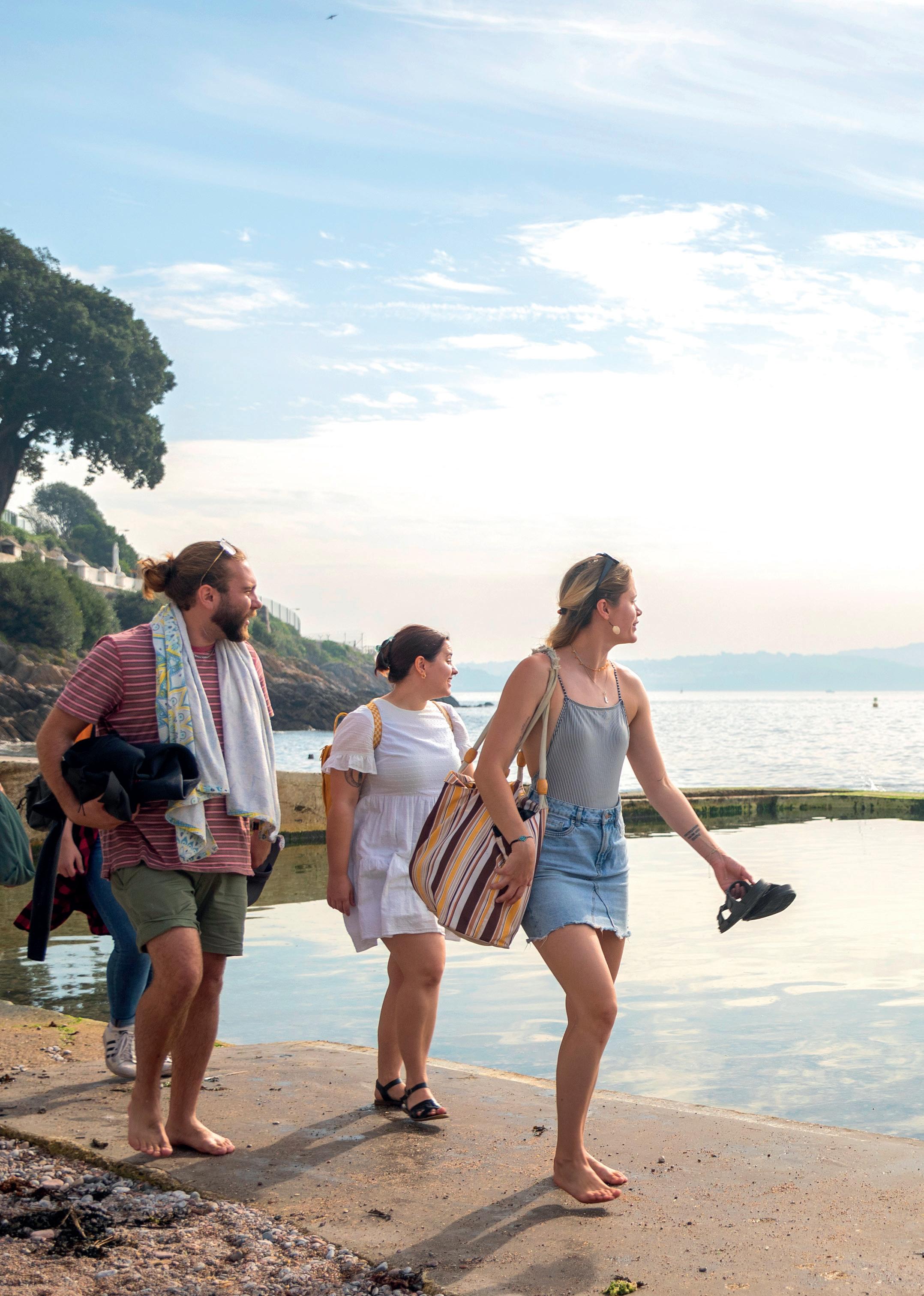
THE CLEARING PROCESS EXPLAINED
PREPARING FOR UNIVERSITY
HOW PARENTS AND GUARDIANS CAN HELP EASE THE PRESSURE OF CLEARING
STUDENT
PLYMOUTH.AC.UK/STUDENT-LIFE
Clearing Edition
Admissions
+44 (0)1752 585858 admissions@plymouth.ac.uk plymouth.ac.uk
Schools & Colleges Liaison
Ruth Bennett, Education Liaison & Outreach Manager outreach@plymouth.ac.uk
University of Plymouth Drake Circus Plymouth Devon PL4 8AA United Kingdom
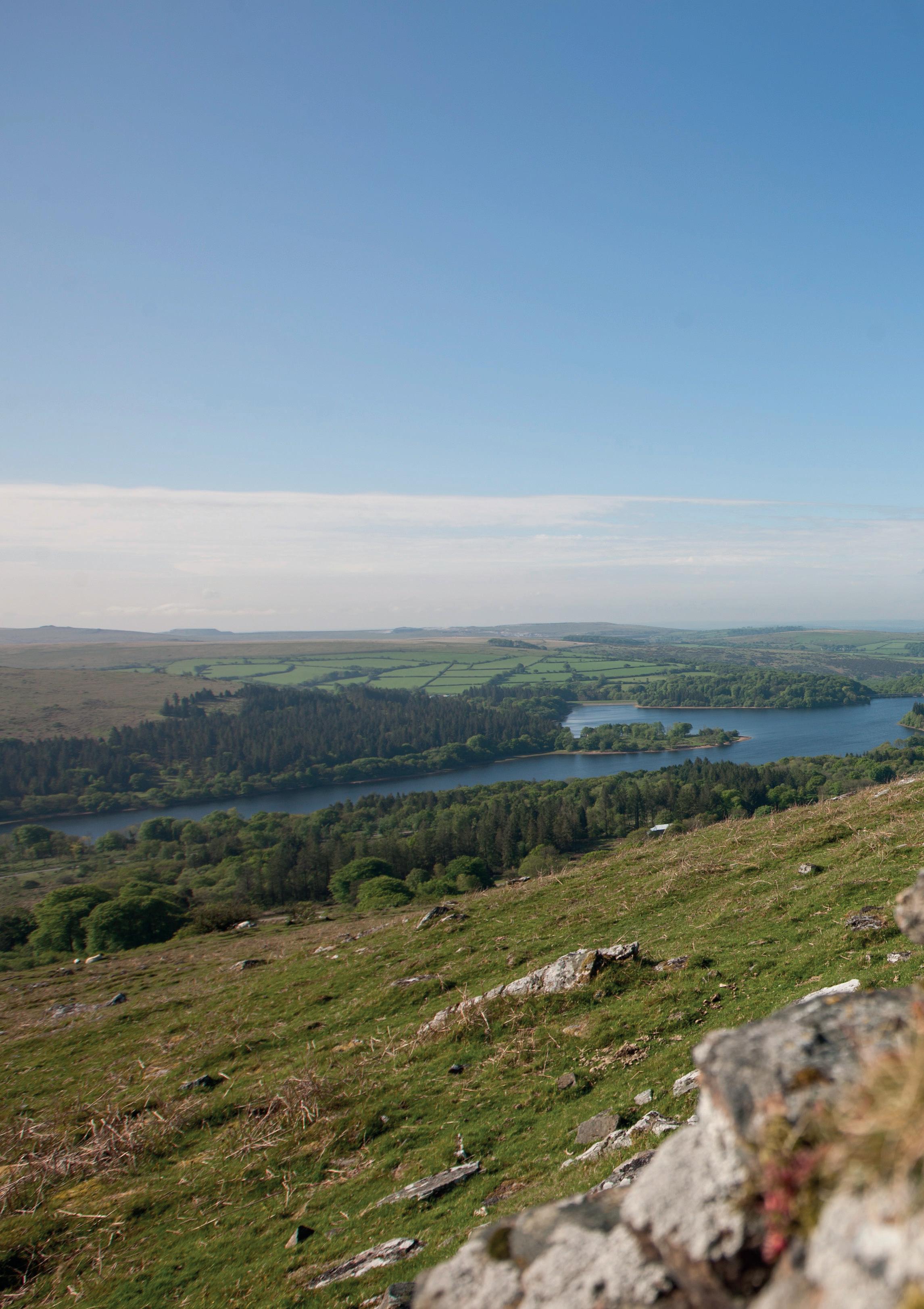
Follow us on social media @PlymUniApply
Beautiful moorland and green spaces are right on your doorstep in Plymouth
Clearing Edition
Welcome to the Clearing edition of Student Life. In this issue, you’ll find content from our current students working in this year’s call centre offering you first-hand Clearing advice, tips on moving away from home for the first time, and a guide for all the parents and guardians out there tackling the Clearing process for the first time. Clearing is a great opportunity to secure the future you deserve, and we can’t wait to welcome you in to our student community.
Meet some of this issue’s contributors:
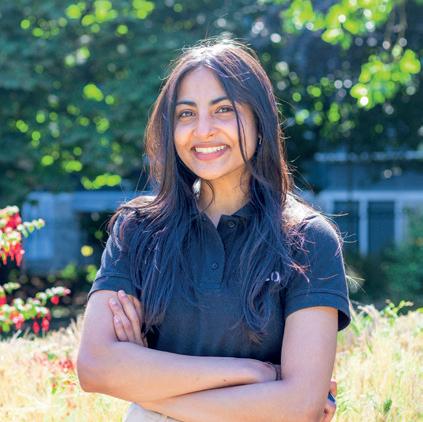
Maahima
BEng (Hons) Civil Engineering Maahima shares how Clearing was the perfect opportunity after a last-minute change of plans. P.16
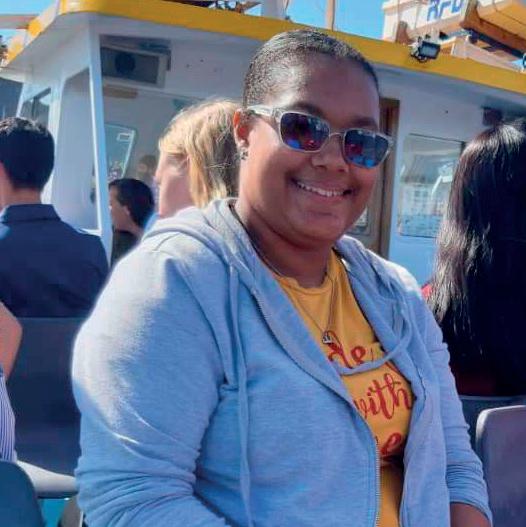
Tsian BSc (Hons) Environmental Science with Foundation Year Tsian and other students who know Clearing give their best advice for the day. P.14
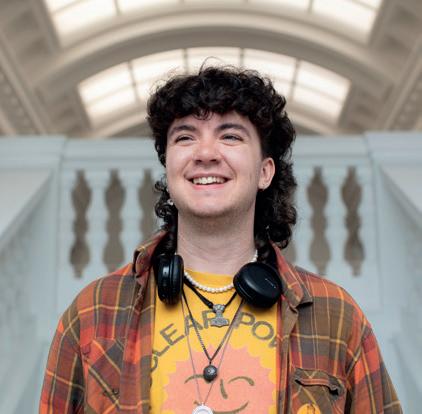
Brodie BA (Hons) Anthropology Brodie tells us why keeping it local and choosing to study at Plymouth was right for him. P.36
DON’T BE A STRANGER
Visit us at our Clearing information day Register now and get ahead of the game
Find out more about your course, explore our campus and the surrounding city at our Clearing information day on Saturday 17 August. We hope to see you there! Book your place early to reserve your spot.
Nervous about results day? Register your details now and get access to our priority line for a quicker service on the day. Giving us your details now means you don’t have to be on the phone too long on results day.
Inside...
HOT TOPICS
P.6 Clearing explained
The Clearing process explained and what happens on results day
P.20 Moving away from home
How to handle the nerves and prevent homesickness
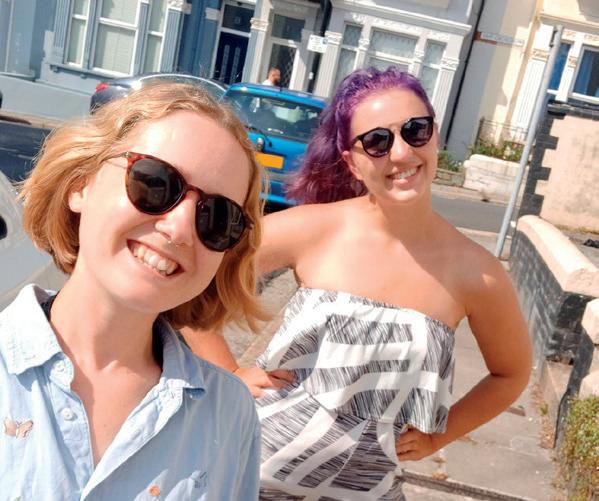
FEATURES
P.22 Preparing for university
How you can prepare for your next big step
P.28 Living in Britain’s Ocean City and beyond
Take a tour through some of our students’ favourite spots

THE GUIDE
P.42 How parents and guardians can help
What you can do to help ease the pressure of Clearing
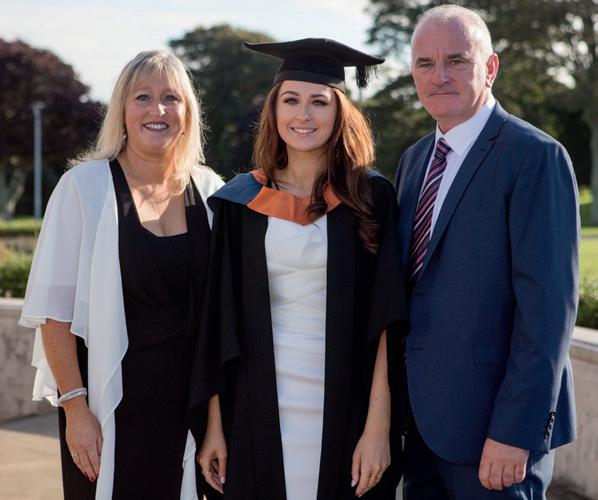
3
A MESSAGE TO OUR FUTURE STUDENTS
4
Find out more about what to expect on results day:
You are only just beginning your university adventure, and this is the start of a whole world of new experiences both inside and outside your studies. Our University community prides itself on how it balances the importance of study along with the importance of a diverse, vibrant and supported social life.
YOUR WELLBEING
We place our students’ wellbeing at the forefront of our University, and we are confident that our community can support you in realising your potential and reaching your goals. Our dedicated Student Hub is your one-stop shop for all non-academic queries. You might want help with your mental health or your student loan, or to check your study timetable, or to find out more about volunteering – our advisers are on hand to support you to make the most of your time at university.
The University and the Students’ Union work closely together to support students and ensure that their voices are heard. Independent advice is always available, and the SU and the University are partners in our Student Charter, which ensures that we provide a safe and supportive environment, and we keep students’ success at the heart of everything we do.
YOUR UNIVERSITY FAMILY
Interacting with others, making friends and having fun are such crucial parts of your university journey. Learning from each other and sharing experiences will help you to become a more rounded person, and equip you with the skills needed to work with all kinds of people when you move on to further study or your future career. As well as coursemates and housemates, you will find a huge welcoming student community as part of our SU. Joining societies and sports clubs will give you a chance to widen your support network and to develop new skills and interests.
YOUR FUTURE
Your degree will play a key part in pursuing your chosen career, but your wider university experiences will really add value to your CV and prepare you for your adult life. Even if you’re not yet certain on your future plans, university will help you to figure out what’s right for you, and our awardwinning Careers Service offers you support and guidance during your time here and beyond graduation, to help build your career path.
We look forward to welcoming you to Plymouth, to share with you a lifestyle and location where both people and our planet are valued, and where you will be able to look forward to creating a positive and impactful future.
YOUR RESULTS
We will be running our Confirmation and Clearing Hotline from Thursday 15 August (A level results day). When you receive your results, we will be here to confirm your place, or to offer you help and guidance on securing a Clearing place.
See pages 6–7 for more information on Clearing.
You can also follow @plymuniapply on social media for more guidance in the lead-up to results day.
Remember, we are here if you have any questions or concerns. If you would like to get in touch, please call us on +44 (0)1752 585858 or email us at admissions@plymouth.ac.uk
5
WHAT IS CLEARING AND WHO CAN USE IT?
Clearing is the process universities use to fill remaining vacancies on their courses (often with slightly lowered entry requirements), by matching them with suitable students who are yet to secure a place at university.
If you get your results and you don’t get the university place that you’d hoped for, don’t panic, you still have plenty of options. In fact, over 38,000 students found their place through Clearing in 2023! Clearing could help you find opportunities you’d never even considered. Use our guide to navigate your way through Clearing, and remember – stay calm.
IS CLEARING FOR YOU?
• If you haven’t applied yet but still want to start university in 2024, you can apply through Clearing.
• If you applied before Sunday 30 June 2024 but didn’t receive any offers (or any that you wanted to accept), you can apply again through Clearing.
• If you don’t meet the conditions of your offer on results day, you can find available places through Clearing.
• If you aren’t sure of your first choice university, you can explore your other options after you get your results with Clearing.

6
PROCESS EXPLAINED
CLEARING TIMELINE
Step
2
Get your results. On 15 August you will receive your A level results, and you'll be able to see online (via ucas.com) whether you have your firm and insurance places. Universities should also contact you directly to confirm your place.
Step 4
You have the option to call as many universities as you like, and gain multiple verbal offers, but you can only make one Clearing application through the UCAS Hub.
Step 1
Get prepared. Clearing opens on 5 July. Universities will publish their course vacancies and you will be able to start researching your options before results day. You can also register your details early to beat the results day rush.
Step 3
Get in touch if you have no confirmed place. Your UCAS Hub will show 'you are in Clearing'. You will need to contact universities directly to confirm vacancies and see whether you can apply. Most universities have a ‘Clearing helpline’ that is usually in operation for several days from results day morning (our hotline number is 0333 241 6929). Remember, universities will need to know your results, so have them to hand along with a copy of your personal statement.
Step 5
Submit your Clearing application. From 1pm on A level results day you can apply to your chosen university by selecting ‘Add Clearing choice’ on UCAS
Step 6
Keep checking UCAS until the university confirms your place. If they don't confirm within 24 hours, you can submit another choice.
Step 7
Once your place is confirmed, you may need to think about student finance and accommodation. Please see pages 10 and 18 for more info.
7
CLEARING FAQs
Where can I find Clearing vacancies?
Vacancies will be listed on the UCAS website (use their search tool to check), as well as on each individual university website. Although these are both updated regularly, to get the most up-to-date information, it's best to call a university directly.
How many verbal offers can I get?
There is no limit to the number of universities you can call, or verbal offers you can get. However, do keep in mind you can only submit one application.
How do I reply to a Clearing offer?
You don’t need to reply to a Clearing offer. Once you add the choice, it’s then up to the university to confirm your place in UCAS.
I don’t want my firm choice – can I use Clearing?
You can release yourself into Clearing by using the ‘Decline your place’ button in UCAS. Your contract with the university will be cancelled and you will lose your place – so only use this button if you are sure you no longer want your place.
Where can I find my Clearing number?
If you are eligible for Clearing, your Clearing number will be on your UCAS welcome page and the ‘Your choices’ section (via ucas.com).
I didn’t meet the conditions of my offer, does that automatically mean I won’t get in?
No, check UCAS first to see whether your place is confirmed or declined. Some universities may still award you a place even if you have dropped a grade, so don’t panic, and check online or call the university directly.
Can I swap my firm and insurance choices now I have my results?
No, you can’t swap your firm and insurance choices if you achieve your grades. If you now want to go to your insurance choice, you need to go through Clearing. You need to check with your insurance choice university that they can accept you in Clearing.
I want to change my course – can I submit a new personal statement? All applications submitted through Clearing will use your original UCAS application. If you want to submit a new personal statement, contact the university directly to find out what their process is for this.
8
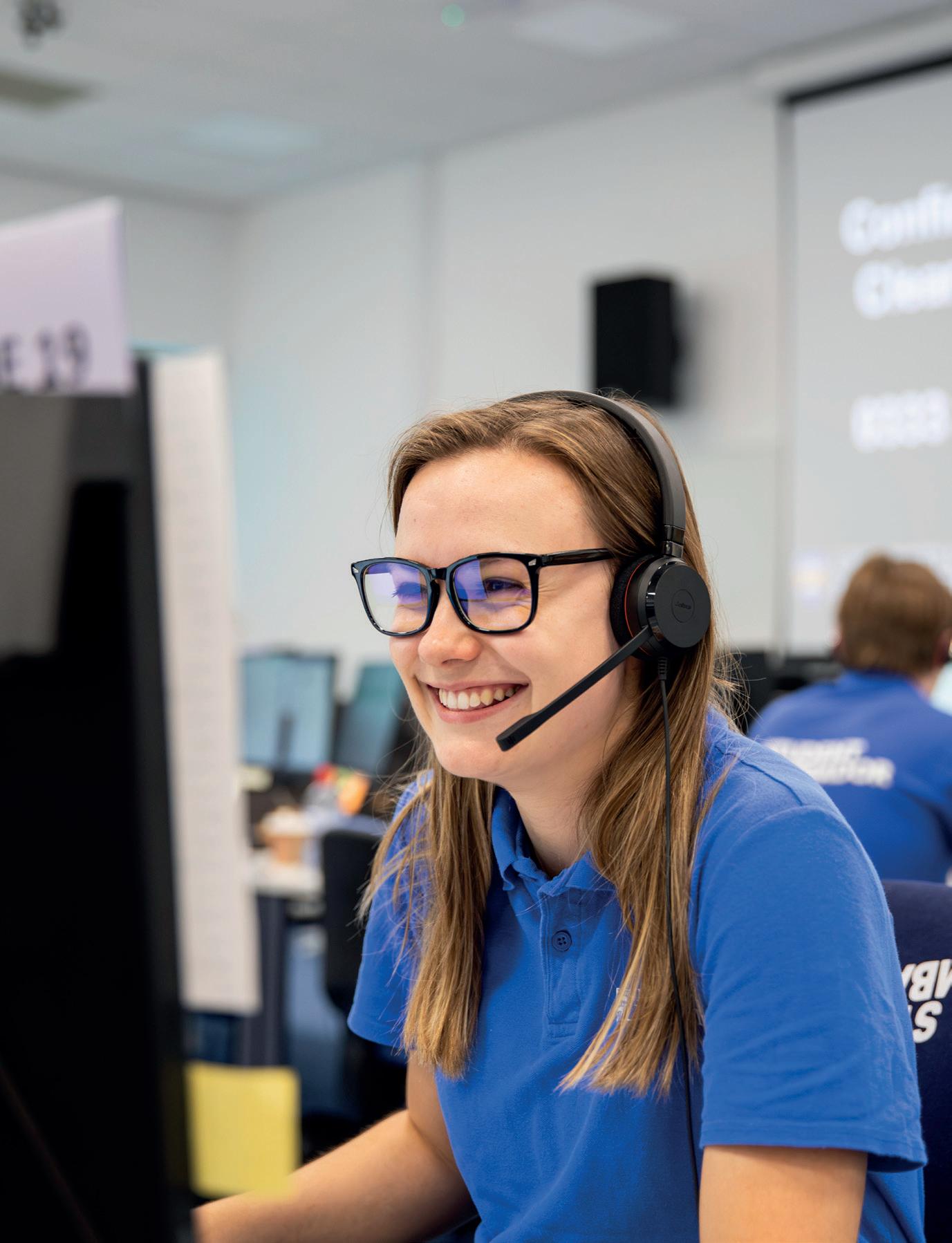
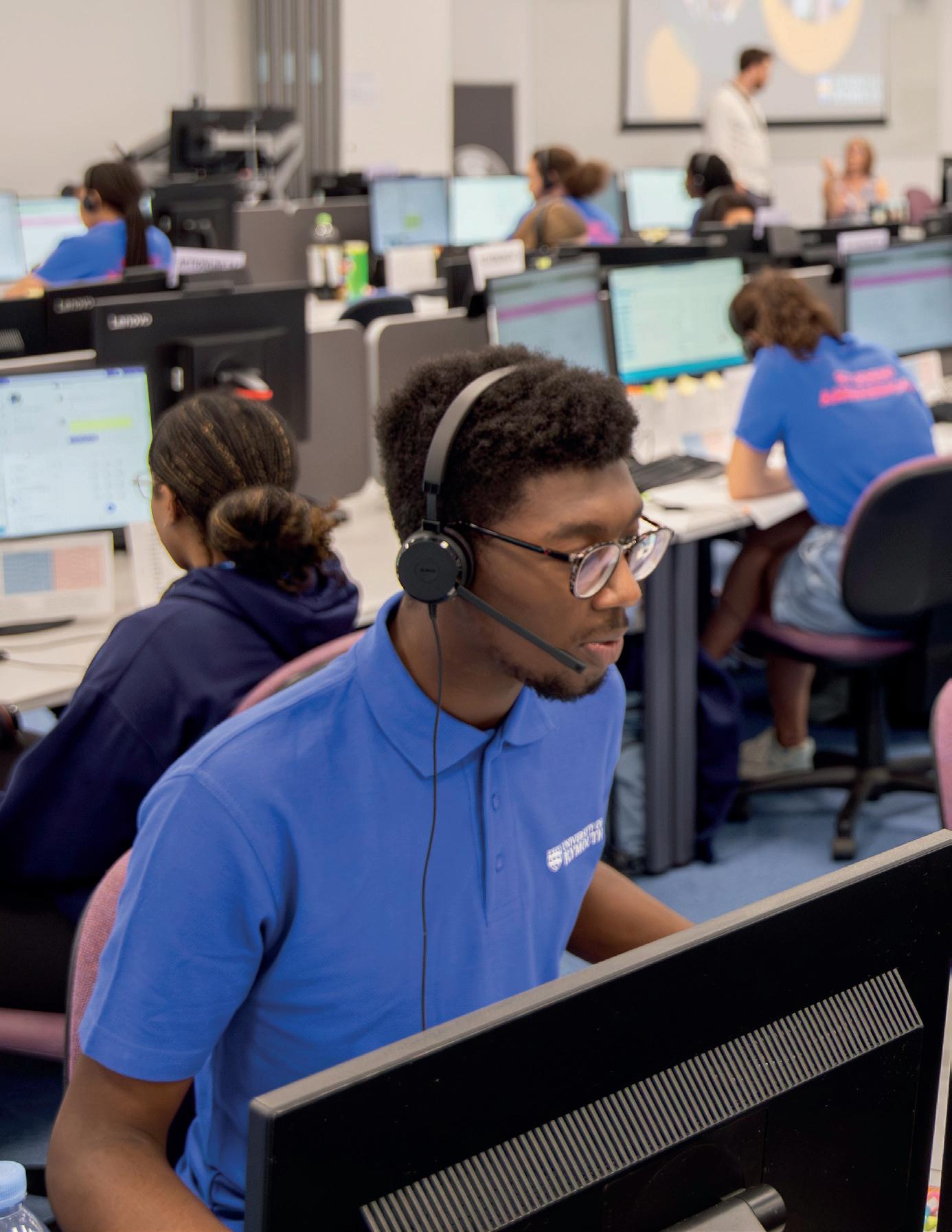
CLEARING TO-DO LIST
BEFORE RESULTS DAY
Register your interest. You can beat the results day rush and get access to our priority line by registering beforehand.
Prepare. You can check which courses have spaces available before the day, or register your interest in certain subjects beforehand.
Review. Think about the universities and courses you originally shortlisted – are your intentions still the same as they were then?
Make notes. Find subjects you’re interested in that have vacancies and write down what interests you about the course, so that nothing slips your mind on results day.
Stay up to date. Make sure you’re signed up to any email or postal communications from the universities you’re interested in. They can often send helpful tips and information in the run-up to results day You can sign up to our emails by submitting an enquiry here:
ON RESULTS DAY
Call us. Our Clearing call centre advisers will be on hand to guide you through your options and help you find your path to uni.
Reach out. It’s completely normal to feel anxious or emotional at this time. Reach out to friends, family or even teachers for support if you need it.
Stay calm. This may sound easier said than done, but don’t forget that there are plenty of options to explore.
9
STUDENT FINANCE AND FEES
Whether you go through Clearing after getting your exam results or you’ve not yet applied, you need to make sure your student finance is sorted.
ALREADY APPLIED FOR A LOAN BUT YOUR DETAILS HAVE CHANGED DUE TO CLEARING?
You’ll need to change the university or college on your funding application as well as the application for your course. You should also make sure you add the correct tuition fee being charged for your new course. If you’re funded by Student Finance England, this can be done easily and quickly at www.gov.uk/student-finance or by contacting the relevant funder if you live elsewhere.
APPLYING TO UNIVERSITY THROUGH CLEARING BUT HAVEN’T APPLIED FOR A LOAN YET?
The official deadlines for student finance applications have passed, but don't worry, you can still apply. However, please be aware that the
funding body may not be able to process your application before your course begins. Whatever happens, the funding body will make sure you have some money as close to the start of your course as possible.
WHAT LOANS CAN I APPLY FOR?
You can apply for a tuition fee loan and maintenance loan to cover university and living costs. Your university or college sets your tuition fee, and the loan is paid directly to them. Your maintenance loan is paid directly into your bank account at the start of each semester.
The online application process does take a while to complete, and your parents or guardians need to complete their parts too, so make sure you do it as early as possible.
Maintenance loans are means-tested against household income, but you don’t have to repay either loan until after you graduate, and only if you are earning over £25,000. Until you reach this earning threshold, you won't pay a penny. When you do reach it, the repayments are arranged on a sliding scale according to your earnings.
FOR MORE INFORMATION, VISIT:
10
MAKE THE MOST OF YOUR MONEY AT UNIVERSITY
We know how important it is to consider your finances before you apply to uni. We want to do all we can to ensure you live your best student life, whatever your financial situation.
FINANCIAL SUPPORT AND ADVICE
There are lots of different ways we can support you. The University offers various bursaries and funds to help students who are experiencing financial hardship. You can also get advice from our friendly and experienced staff in the Student Funding team. The Students’ Union also offers advice on making the most of discounts available exclusively to students through rewards and loyalty cards.
HEALTH AND WELLBEING
Take advantage of the Give It a Go programme, which offers a weekly timetable of exercise activities including badminton, yoga and climbing. All activities have equipment provided and are either free or low cost. The SU Gym offers low student pricing and a cooling-off period for subscriptions (new members receive a refund if they change their mind). There are free menstrual products and showers across campus, and free toiletries in the Hive in the SU. You can also find free mental health support, counselling, and pastoral and spiritual support at the Student Wellbeing Service in the Student Hub.
FOOD AND DRINK
Students can heat food for free using the microwaves in the SU and Charles Seale-Hayne Library. There are plenty of water bottle refill points around campus to ensure there is no need to spend money on water. A variety of good-value meals and snacks can be purchased at the campus cafes, and customers who bring a reusable cup can receive a discount on drinks. Make sure you download the Too Good to Go app! You can reserve discounted food from the campus cafes and restaurants around the city centre at certain times of the day.
TRAVEL
Students can apply for a range of bus discounts for travelling around the city. The SU also offers help with applying for discounted bus passes. There is also the 16–25 railcard, which enables you to save at least 1/3 on train fares throughout the UK. The University supports active travel by providing free and secure cycle stands. Plymouth City Council also provides a range of cycling offers, including free bike loans, maintenance courses and training.
BUDGETING TIPS
As the maintenance loan is paid in three instalments, it’s up to you to budget this so you don’t get caught out! Our current students have suggested the following budgeting tips.
1. DON’T SPLASH OUT TOO MUCH ON ACADEMIC BOOKS in the first year –look out for second-year students selling their old books.
2. USE A BUDGETING APP if you struggle to keep tabs on how much you’re spending.
3. A PART-TIME JOB can be a great experience if you can manage your time well while you’re studying.
4. TRY NOT TO EAT OUT TOO OFTEN but when you do, always try to use vouchers and discount codes.
5. DOWNLOAD THE UNIDAYS APP AND BUY A 16–25 RAILCARD as this will save you lots of money when travelling and shopping.
6. DON’T KNOCK SUPERMARKET BASICS until you’ve tried them. Rather than buying branded foods, go for cheaper alternatives.
7. HAVE SEPARATE ACCOUNTS for your loan and rent so you can see what you are spending your money on and what’s coming in and going out.
11
STUDENT BUDGETING TOP TIPS
Understanding your finances as you transition to university life is a big step, but our current students are here to share their tips.
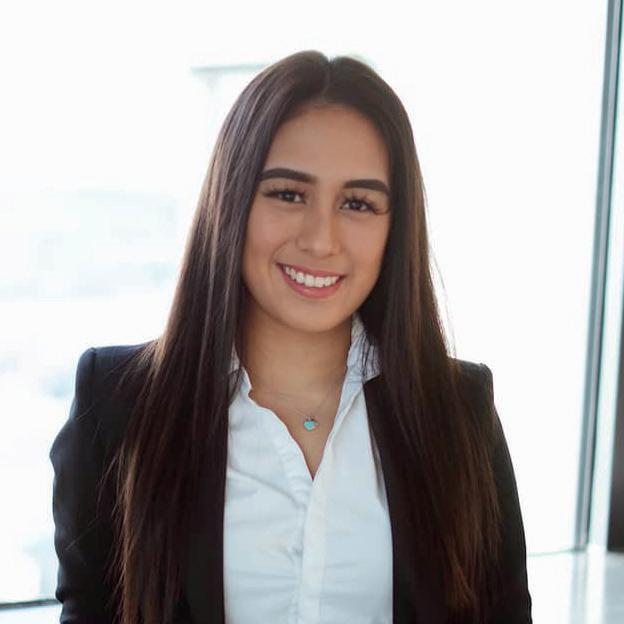
“I calculated my monthly expenses and how much on average I would spend a month, to figure out my monthly outgoings and how much money to leave myself with as my monthly budget. Overall, budgeting will be different for everyone depending on income and lifestyles. However, definitely ensure you are putting money to the side for rainy days but also don’t forget to treat yourself as you only live once!”
Shaina, BA (Hons) International Business
“I have two part-time jobs, so as soon as I get paid I’ll calculate whatever 20% is, and I’ll put 20% straight into savings right away, so I know that I won’t be spending that 20%. That’s a commitment I make to myself every month, and I find it has helped me to be better at saving, and not just spending away when I get paid.”
Christian, BSc (Hons) Geology student

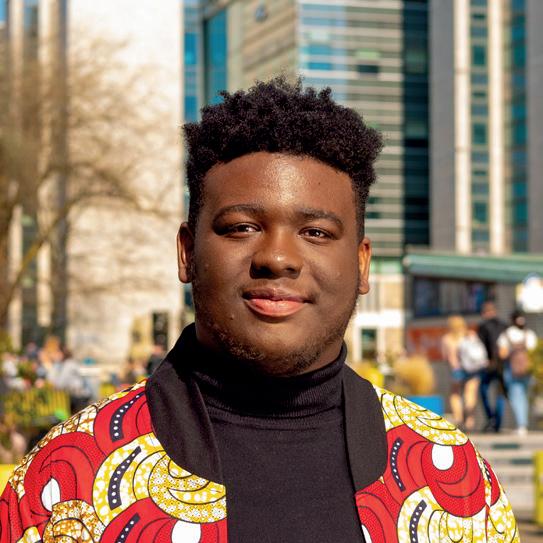
“One of the ways I save money, or prevent myself from spending money, is I have a student account where I keep my savings and my student loan together in one place. Then I have a spending account with a debit card separately for tap and spend. I don’t keep any money in my spending account which means I have to transfer money over every time I want to buy something. This means I have to think about each purchase, which does mean I do spend less.”
Brodie, Ba (Hons) Anthropology
12
“Setting a realistic food budget is important. I tend to keep a monthly budget and a rough weekly budget as well, depending on what I have left over from the week before, which influences how much I’ll spend the next week. For example, if I have lots of curry left from my bulk cook the week before, this week will be a cheaper week! On a Sunday, I write a meal plan and a shopping list of everything I need, that way I only need to food shop once a week. Home cooking is one of the easiest ways to cut down on food costs. Things like curry, spaghetti bolognese and pasta bake are very easy to bulk make. I often get 4–6 meals out of a batch.”
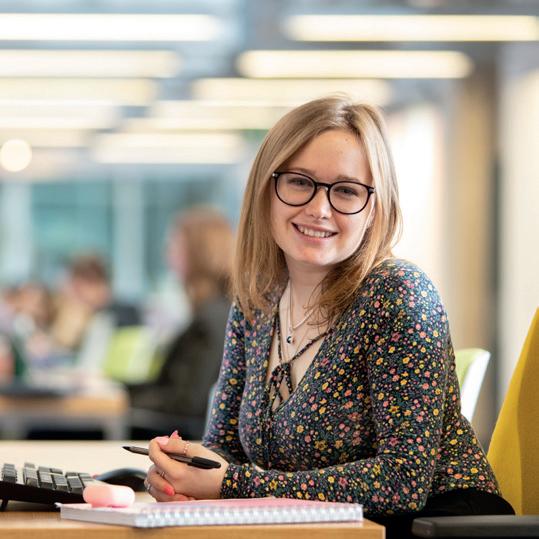
Cerys, BA (Hons) Architecture
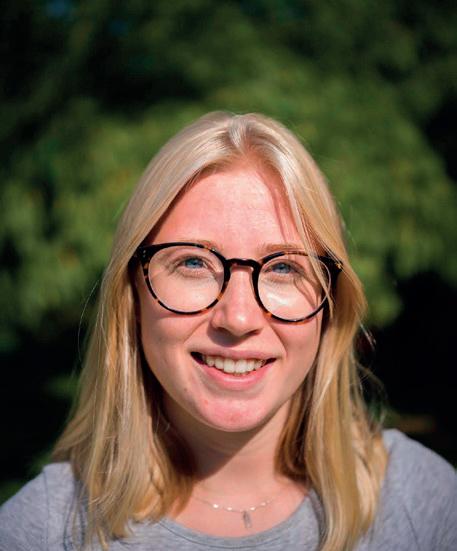
“As your student finance payment is made to you, pay your rent. This will be your biggest expense and once it is paid, you will be aware of what is left in your account for the semester. If you set yourself a realistic weekly budget, you will be able to afford the basics and more! The Careers Service can help you find parttime work, and at the beginning of the semester a Careers Fair is held, so you will be able to earn money and gain valuable work experience.”
Kenzie-Jayne, BSc (Hons) Business Management
“Recognise the power of planning! To kickstart your budgeting journey, consider creating an Excel spreadsheet or using budget planner apps on your phone. These have all helped me in planning my expenses, setting reminders, and staying on top of my finances every month. I recommend shopping with a list to avoid impulse purchases. For cooking inspiration, you can turn to online platforms like YouTube and Instagram for budget-friendly and healthy student meal ideas. You can also explore deals and discounts offered by the Students’ Union!”
Jessica, BSc (Hons) Biological Sciences
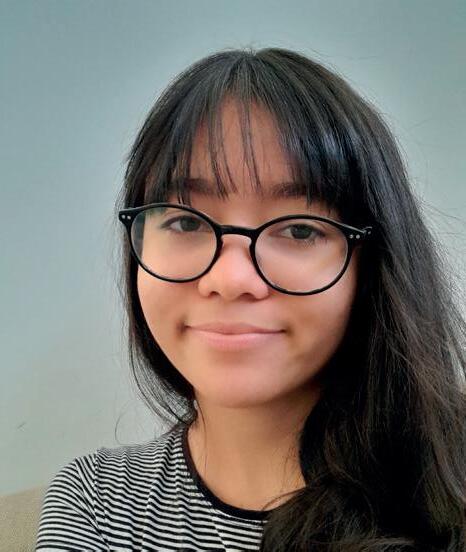
13
MEET OUR CALL CENTRE STUDENTS
Come results day, we have an army of students manning the phones in our Clearing call centre. We spoke to four of our Clearing Ambassadors about their advice to callers.

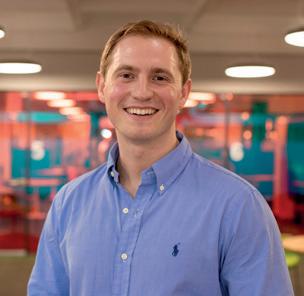
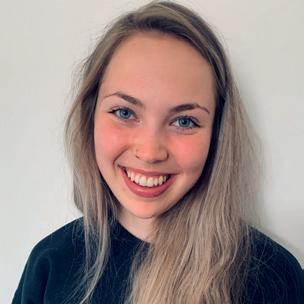
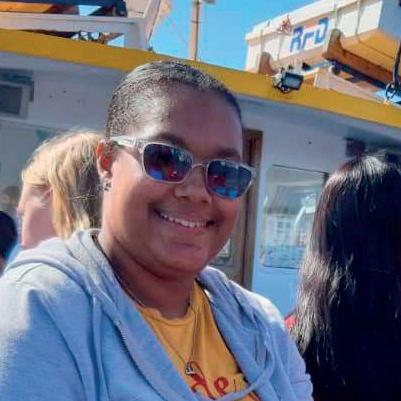
TSIAN BSc (Hons) Environmental Science with Foundation Year student
What do you do as a Clearing Call Centre Ambassador?
“I answer calls at our busy call centre from early morning on results day. We are there to answer any questions and provide support to prospective students. If someone is calling to see if there is availability on a course, we take some basic details, including qualifications, and will then check whether the course is open for Clearing applications, and whether the caller meets the entry requirements. If someone meets these requirements, we then set up a prospective student record and give advice on the next steps of applying through Clearing. If someone unfortunately doesn’t meet the Clearing entry requirements, we will offer advice on similar or alternative courses, which may be an option at Plymouth or at a partner institution.” – Hannah
Do you have any advice for students ahead of Clearing?
“Stay positive, and remember to ask anything that’s on your mind. Whether it’s specifics about courses or what life is like on campus, no question is too small or too big. We’re here to help guide you and support you as you navigate the process. Also remember, this is an opportunity to explore pathways you may not have considered before.” – Adrien
“My advice would be to keep your options open. Ensure you find some time to do some research and find what options are out there for you! When Clearing opens, we will be waiting to discuss your options with you.”
– Philippa
Some questions you might want to ask:
These are my achieved grades, could you talk me through my options? What is the workload breakdown for my chosen subject? Am I able to switch courses? What accommodation options are available? What is the accommodation application process for Clearing students? What is it like to live and study in Plymouth?
CLEARING HOTLINE 0333 241 6929
HANNAH BMBS Medicine student ADRIEN BA (Hons) Architecture student
PHILIPPA BA (Hons) Acting student
14
1 3 5 2 4 6
Is there something you’d like to say to students who might be anxious about results day to put their minds at ease about Clearing?
“Breathe, you will be okay. We put all our energy into finding you a path to uni.” – Tsian
“Try not to worry. Although that is easier said than done, whatever the outcome of your results, there is always an option for you. We will do whatever we can to help support and guide you to find the right path for you.“
– Philippa
“Don’t let nerves prevent you from reaching out to universities. More often than not, there are alternative courses available that might capture your interest. So take a deep breath, and remember that options are available to help you move forward.” – Adrien
Why do you enjoy your role as a Clearing Call Centre Ambassador?
“I love interacting with people, helping students achieve their university dream and most importantly, sharing my experiences and love for all that is Plymouth and the University.” – Tsian
“I have been a Clearing Ambassador for four years and I really enjoy it every year. I like being able to help people achieve their goals of studying a certain subject. Being a small part of their journey into university is a very rewarding experience. I also know how frantic the whole experience can be, having been through it myself, so I like to be able to reassure prospective students that we are here to help as much as possible.”
– Hannah
“The most rewarding moment is when I can share the fantastic news that they’ve met the criteria and extend to them an offer to join us. This role allows me to play a part in shaping futures, and that’s why I enjoy it so much.” – Adrien
Universities do not treat Clearing students the same as students who applied earlier. FALSE!
You will be treated exactly the same as every other student, regardless of when you applied.
If you have been accepted at your firm or insurance choice university, you can still apply through Clearing. TRUE!
Even if you are currently holding an offer at a university, you can still go through Clearing – you will just need to release yourself into Clearing via your UCAS Track. This is quite risky though as you will lose the place you are holding, so make sure the new university you wish to apply to has room on the course and can accept you.
You won’t have the chance to visit the university you apply for via Clearing. FALSE! A lot of universities run Clearing-specific open days the weekend after the A level results day, giving you a chance to view the campus and accommodation before making your final decision.
Your student finance will be delayed if you come through Clearing. FALSE!
As soon as you know which university you are going to, you just need to log on to your student finance web portal and update the details to ensure that your money isn’t delayed.
You can’t apply for a different course through Clearing. FALSE!
You can apply for any course that is available through Clearing. This could be something completely different to what you have applied to before. If this is the case, you can ask the university whether you can send in a supporting statement alongside your application about why you wish to change course direction.
You can apply to a university that previously rejected your application, or to one where you declined their offer. TRUE! You can apply to any university through Clearing, as long as they have spaces on the course you wish to study, if you were rejected because of your predicted grades in the earlier cycle. If they rejected your application owing to additional conditions, such as performance at interview or occupational health checks, just phone them to check you can apply again.
HOTLINE 6929 15

EMBRACING THE OPPORTUNITY OF CLEARING
BEng (Hons) Civil Engineering student Maahima joined the University directly through Clearing. She tells us about the call centre process, her university experience and her top tips.
16
STUDY CIVIL ENGINEERING
UCAS tariff 112–128 points
Duration 3 years full time (with placements)
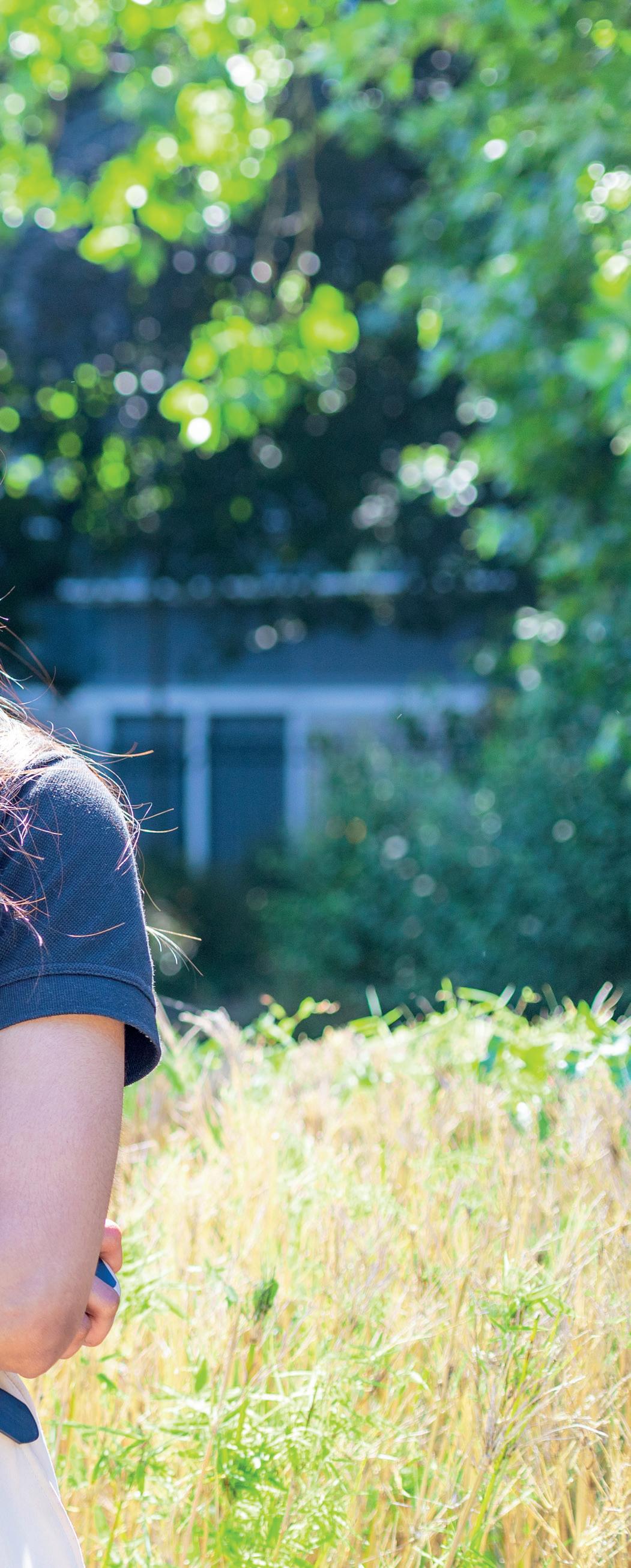
“Stay positive and flexible - embrace the opportunity to explore alternative options and be open to considering courses you may not have initially considered.”
WHAT RESEARCH DID YOU DO INTO CLEARING PRIOR TO RESULTS DAY?
I did little to no research on Clearing other than the fact that I knew it was a potential option. Looking back, it would have been an advantage to look in to it a bit more beforehand, because you need to make a life-changing decision on results day and do it quickly before all the places on the course run out. Understanding how it works, which universities participate in Clearing, available courses and all the deadlines can be a great help.
WHY DID YOU APPLY THROUGH CLEARING AND WHAT HAPPENED ON RESULTS DAY?
Due to the pandemic and all the crises that followed, for me, it was a very last-minute decision to study at the University of Plymouth. By applying through Clearing, I was lucky to be able
to start university in the same academic year, rather than having to wait another year. I actually chose to apply through Clearing the day after results day, although it is generally advised to act promptly. For me, it was essential to come to terms with the fact that my original university plans had changed and take the necessary time to make a well-considered decision about my future. Taking this time allowed me to process my emotions and carefully evaluate the options available to me. I believe that dedicating a day to reflection and decision-making was a reasonable timeframe, given the time-sensitive nature of Clearing. It was crucial to ensure that I made the right choice for myself, as this decision would impact the next few years of my life.
WHAT DID THE PROCESS OF APPLYING THROUGH CLEARING LOOK LIKE?
It was a relatively straightforward process. Courses available at the University could be viewed via UCAS, or you could contact the University directly, as I did. I provided my details, UCAS ID, grades, and the course I was interested in, and they checked whether there was space for me. Once they gave me the green light, it was up to me to apply using UCAS. I submitted my application, and I received an email confirming my unconditional offer soon after.
DID YOU SPEAK TO SOMEONE AT OUR CLEARING CALL CENTRE AND HOW DID THEY HELP YOU?
As an international student, I contacted the Clearing call centre before being directed to the application hotline, due to visas and other restrictions. Although the conversation was brief, they answered all of my questions regarding accommodation, their experiences living in the city, and the availability of part-time jobs. The person was really patient and even emailed me all the accommodation options for me to look into in detail later.
HAS THE FACT THAT YOU APPLIED THROUGH CLEARING HAD ANY IMPACT ON YOUR UNIVERSITY EXPERIENCE?
In my opinion, Clearing does not have a significant impact on your university
experience. The Clearing process occurs before the academic year begins. September marks the starting point for both students who entered through Clearing and those from the main application cycle. Once enrolled, the university experience is shaped more by students’ engagement, involvement, and dedication to their studies and student life.
WHAT WOULD YOU SAY TO SOMEONE APPLYING THROUGH CLEARING?
I would recommend that you have your details, such as UCAS ID, phone number, address and other information, ready before calling. My advice would be to be patient, particularly on results day, as you are likely to be placed in a queue–no matter which university Clearing hotline you call. It usually dies down on the second day, but it is critical to speak with someone before applying for Clearing in UCAS, as you have only one clearing option and them having a record of your call would increase the likelihood of your clearing application being accepted.
WHAT ARE YOU HOPING TO ACHIEVE IN
THE FUTURE?
My goals have shifted from obtaining a bachelors degree (BEng) to pursuing a masters degree (MEng), which would help me achieve chartership in my field. In a broader sense, I do hope to utilise my degree to make a meaningful impact and find fulfilment in both my professional and personal endeavours.
CAN YOU GIVE US YOUR TOP CLEARING TIPS?
Be proactive – research universities and courses in advance, so you are prepared to make decisions quickly during Clearing. Stay positive and flexible – embrace the opportunity to explore alternative options and be open to considering courses you may not have initially considered. Finally, seek guidance and support; although Clearing is your choice to make, there is no need to go through this process alone. Seek advice from teachers, family, or university Clearing call centres to make informed decisions during the application process.
17
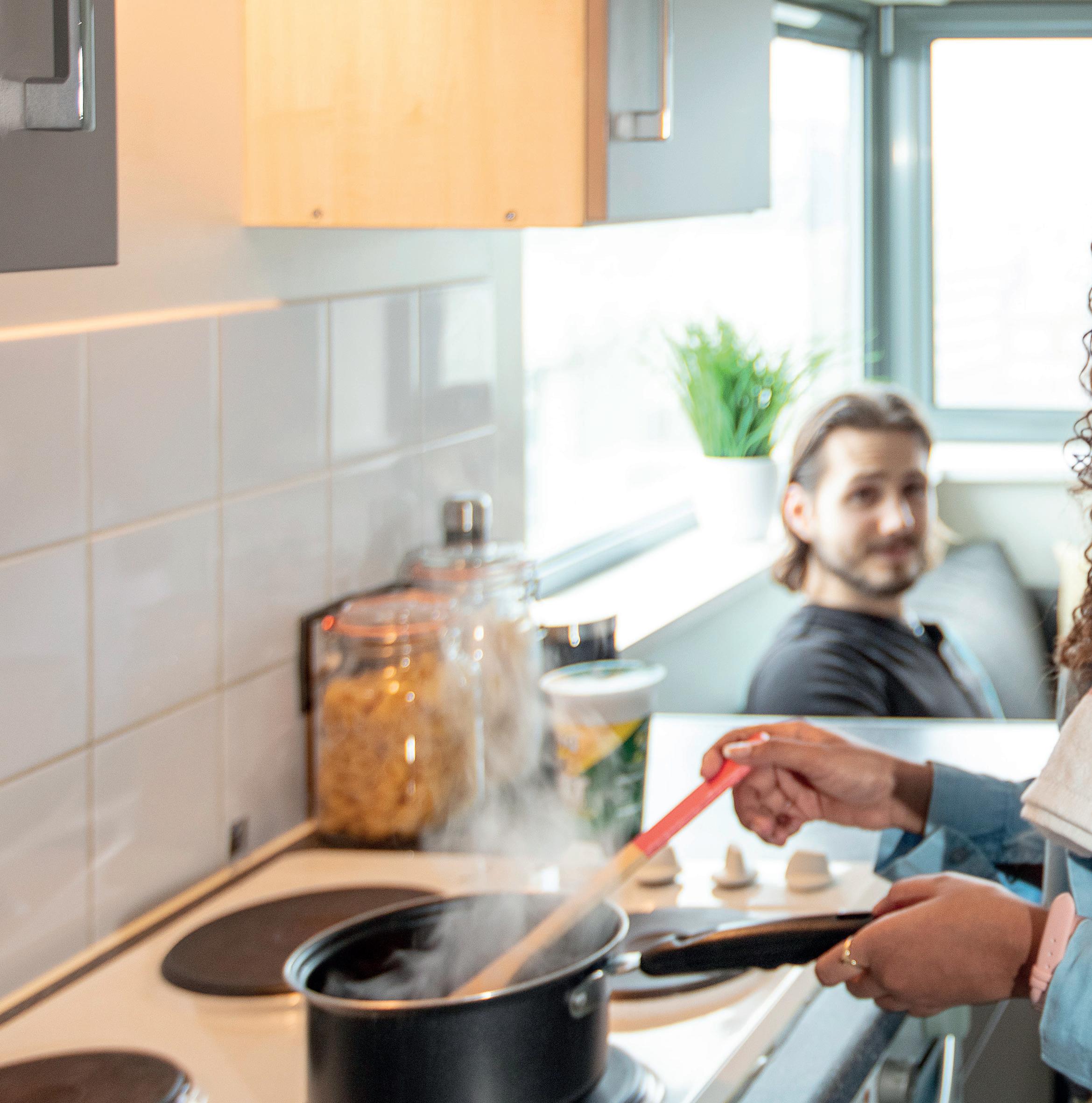
YOUR HOME FINDING
If you’re applying through Clearing, we guarantee you a room –either in our University-managed accommodation, in a managed partnership with ANUK-accredited private accommodation, or with an alternative private provider, provided you meet the terms and conditions.
HALLS OF RESIDENCE
University-managed halls of residence are a great opportunity to meet people straight away. It’s often your flatmates that become your first university friends! There are also plenty of other opportunities to make friends on your course and through extracurricular activities.
UNIVERSITY-MANAGED HALLS
Directly located on campus and in the nearby Student Village.
A dedicated Halls team available in the evenings and at weekends.
18
“Once
you accept your place on your course it is crucial to start the process early, as most student rooms are booked on a first come, first served basis. I had the opportunity to speak directly with the accommodation team over the phone and I was able to book my room on the call itself. Shortly after, I received a room booking offer by email.”
Maahima, BEng (Hons)
Civil Engineering
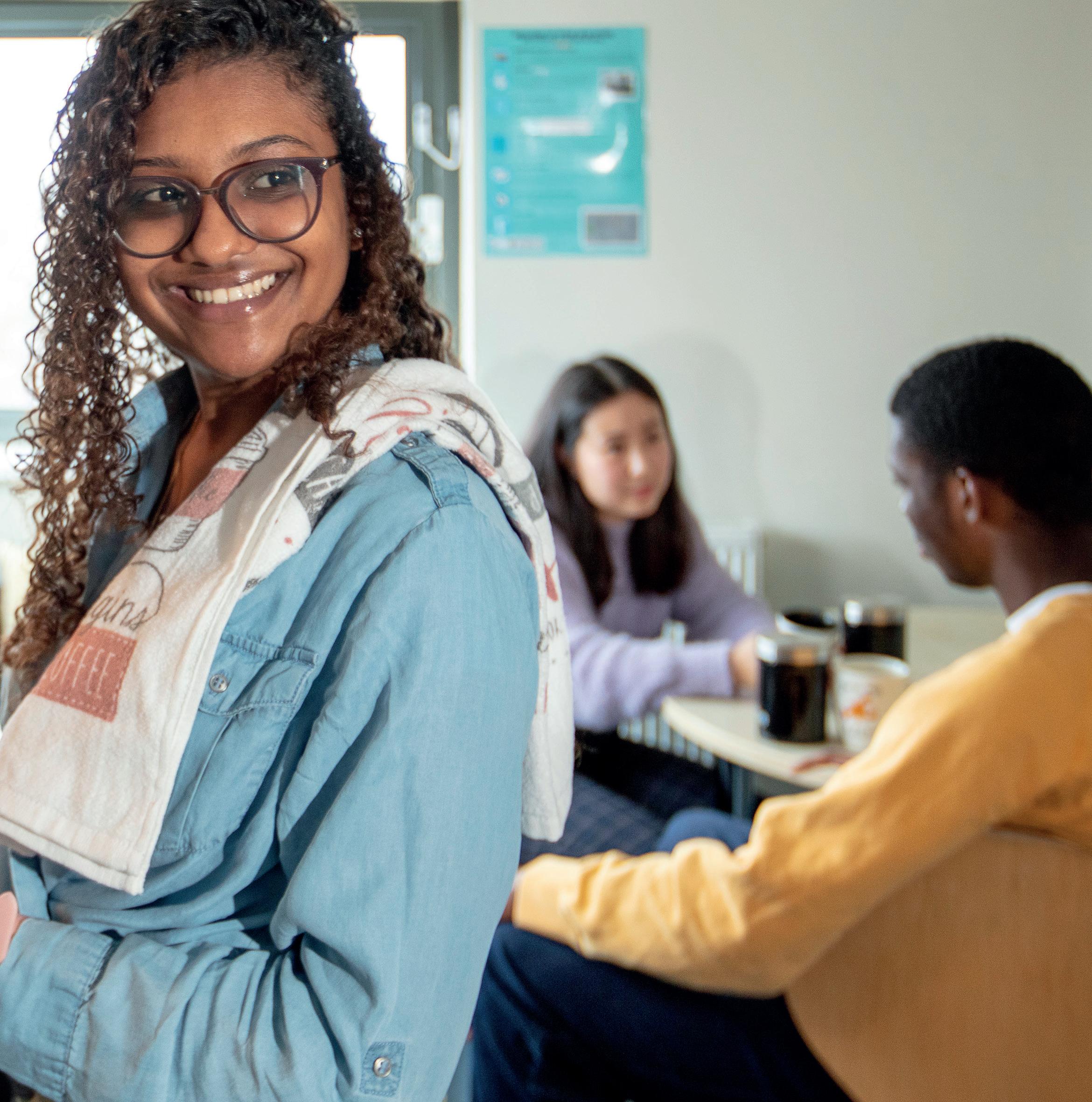
24 /7 campus security
Exclusive ‘Residence Life’ events and trips for residents
Safe social media communities –get to know your hallmates before you arrive!
Discounts and exclusive deals for residents.
Support from the University Accommodation team.
APPLY FOR YOUR ACCOMMODATION
Please call the University’s Clearing Hotline on 0333 241 6929 to apply.
Once you have been offered a place here at the University, you will be put through to the Accommodation team, to discuss your room options and make your booking.
MADE A BOOKING BUT NO LONGER REQUIRE YOUR ROOM? If your plans have changed and you will no longer be attending the University, please get in touch with us as soon as possible, to inform us that you will no longer be enrolling.
Once you have confirmed this with us, we will refund your two weeks’ advance rent payment, cancel your booking and make your room available for someone else.
EMAIL US AT: uniaccommodation@plymouth.ac.uk
FOLLOW US ON SOCIAL MEDIA: @plymuniaccomm
19
MOVING AWAY FROM HOME
University of Plymouth graduates, Tilda and Millie, talk about their experiences of moving to uni, and what they found helpful when settling in.
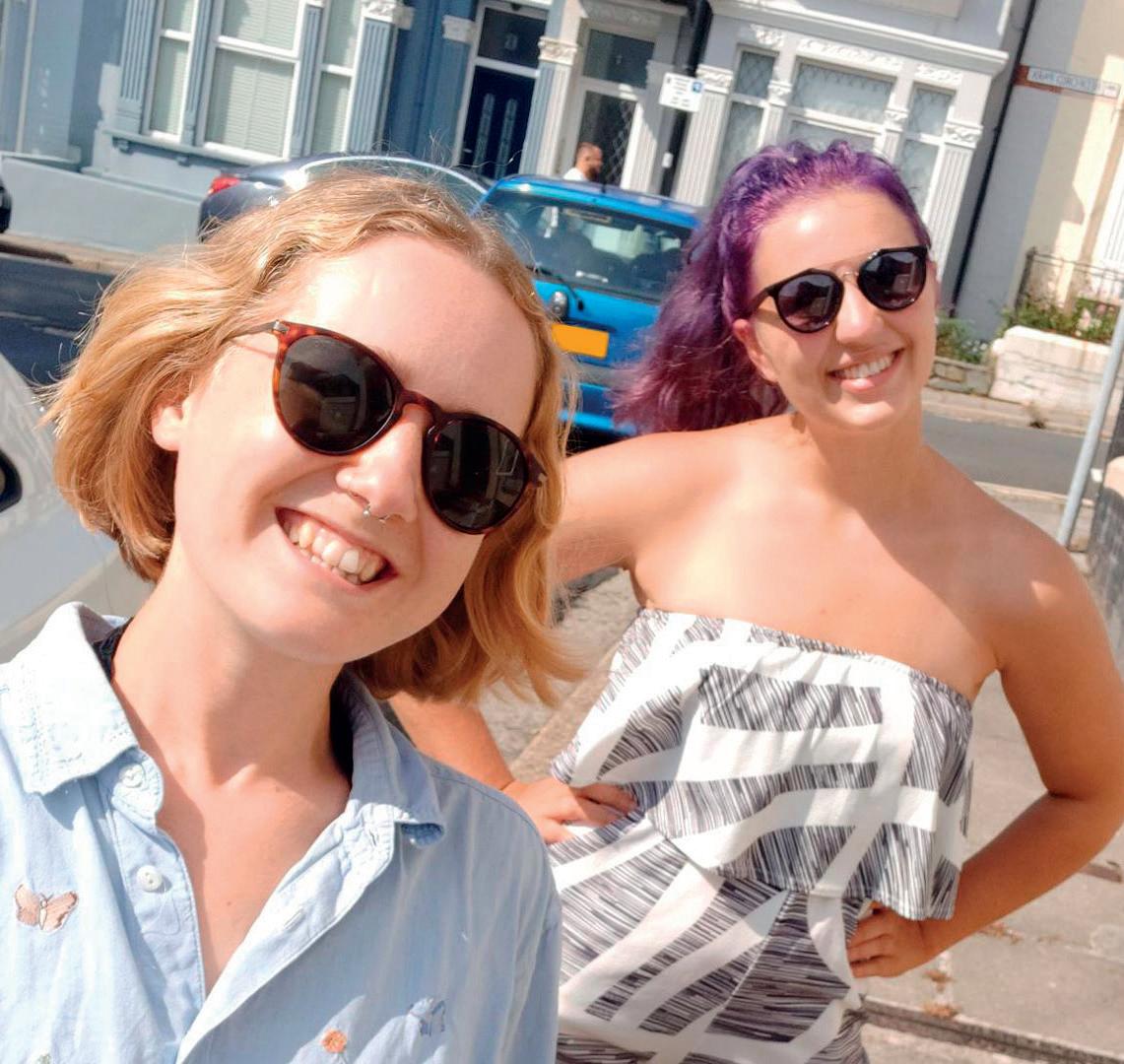

Find out more about what to bring to uni:
Explore Residence Life activities and events:
How to cope with feeling homesick:
20
“I definitely think when you’re coming to university you have to manage your expectations and not put too much pressure on yourself when you first get here to acclimatise immediately, to make loads of friends, to reinvent yourself the minute you step into your student accommodation.” – Tilda

“For the first time in my teenage life, I didn’t feel anxious; I was just so excited to get there. I threw my bags down and just kind of forgot about everything. But it’s very easy to think that that’s how everybody feels – I think it’s really important to emphasise that.” – Tilda
“Sometimes you might be excited about change, or sometimes it might be really nerve-racking and really emotional for you; both are equally valid experiences and there’s not a ‘normal’ way to start university. Everybody starts it and feels differently about it.” – Tilda
“See if you can meet your housemates before on social media or something like that – that might help you get talking.” – Millie
“Luckily for students, you will have moments where you can invest that time into yourself and work out what techniques and what tips really help reduce your stress or reduce your anxiety.” – Tilda
PREVENTING HOMESICKNESS
Feeling a bit homesick when you arrive at university is totally normal. For many students, this might be the first time you’ve been out in the world on your own, fending for yourself, doing your own laundry. To help you settle in, use these top tips from students and you’ll be feeling at home in no time.
Don’t beat yourself up about it
At some point, everyone will feel a little homesick. There is nothing to feel embarrassed or ashamed about. Leaving home is a big step and you are going to have all sorts of thoughts creeping up on you, some exciting and some scary. You don’t need to add to those by being unfairly harsh on yourself about how you’re feeling.
Make a new home
Start by making your new living space your space. You’re going to be spending a lot of time either chilling or studying in your room, so you need to get it just the way you like it. Buy some decorations or bring some objects from home. In the first few weeks of term there will be poster sales and plant sales on campus. Before you know it, you’ll have turned your plain room into a cosy nest that you can relax in.
Get offline and
explore
While it may be tempting to remain safely locked up in your room, you have a brand-new environment that’s waiting to be explored. Go out and take pictures. Visit the local landmarks and bring back a trophy or souvenir from your travels. Then you’ll have something interesting to share with friends and family when you do go back on social media.
Get organised
The first few days and weeks are probably going to be the most hectic, and it’s here that you may feel a bit lost. By sorting your weeks out with a simple timetable, you’ll feel like you’re more in control of what’s going on.
Look after yourself
Your new-found freedom and independence will be an exhilarating experience, but just remember that you still need to look after your body. Make sure that you are eating properly (the vending machine doesn’t count) and try to get plenty of sleep. Being run down can lead to feeling overburdened, so take some time to make sure that your body is being looked after too.
Talk to people
This can be the hardest one, but you need to try and remember that your new housemates and coursemates are in the exact same position as you are. Sometimes people are just waiting for someone to approach them, so be brave and be the person to make that first step. Your new best friend may be one conversation away.
21

PREPARING FOR UNIVERSITY
We know that going to university may seem like a big step, but it’s also one of the most exciting times of your life where you get to spread your wings and seek new experiences. There are a number of things you can do to get prepared for the transition to university to make the process feel less daunting.
22

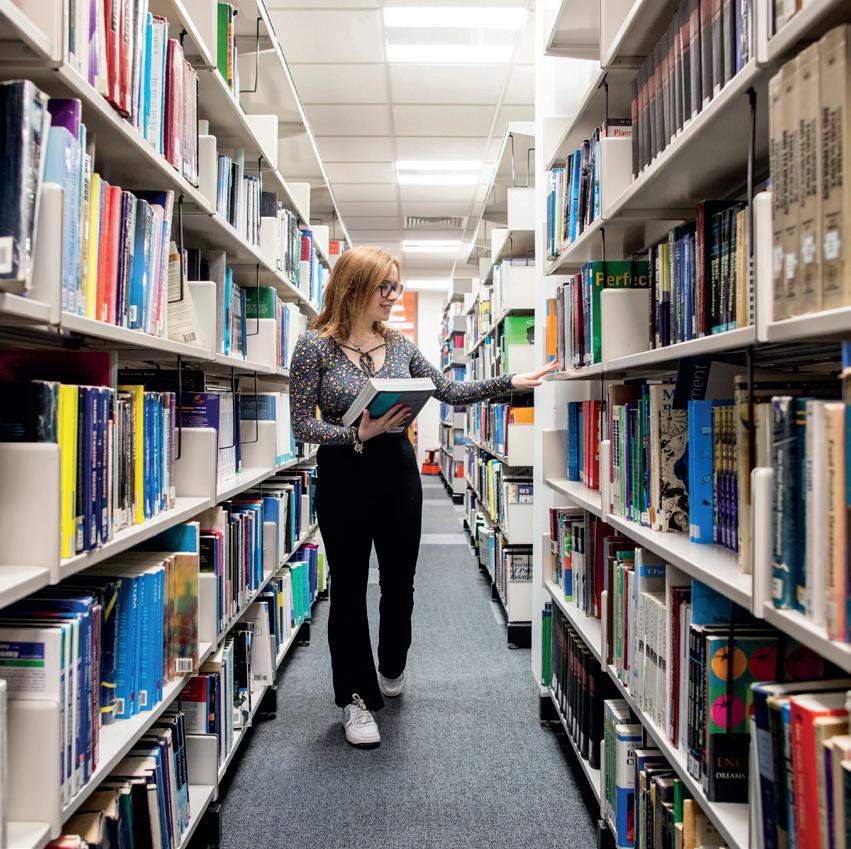
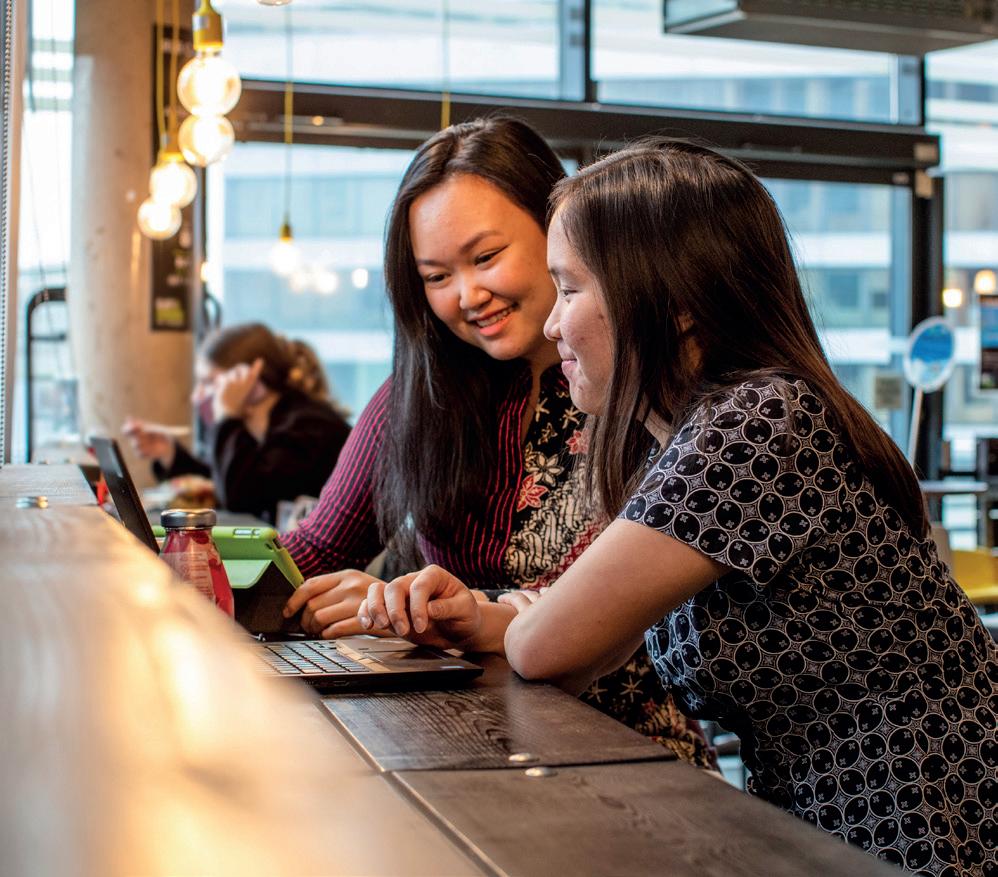
LISTEN TO OUR STUDENT LIFE PODCAST
Our Student Life podcast is here with advice and guidance about transitioning to university! Topics covered include mental health, careers, our Students’ Union and societies. Listen now and make sure to follow the podcast on Spotify to keep up to date with the latest episodes.
CHAT WITH CURRENT STUDENTS
Chat to our students through Unibuddy and ask them questions about their course, accommodation, funding, placement years and their future aspirations.
STUDENT BLOGS
Read blogs written by our students to gain a deeper insight into the areas you’re interested in. From living in accommodation to everything you need to know about your first year, get reading and feel one step closer to studying with us.
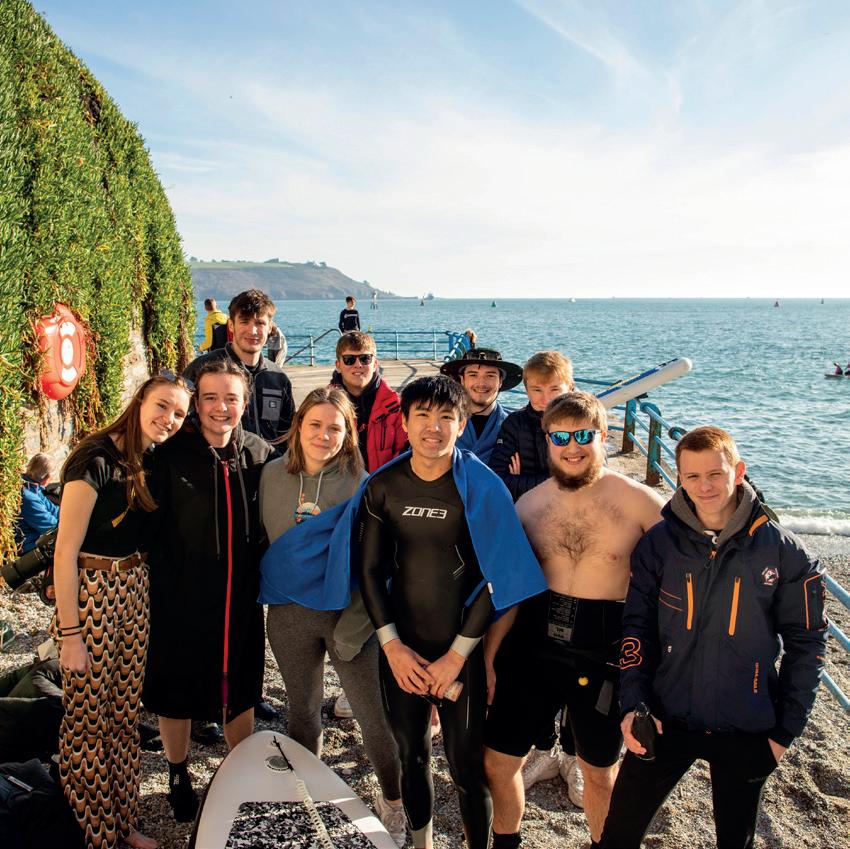
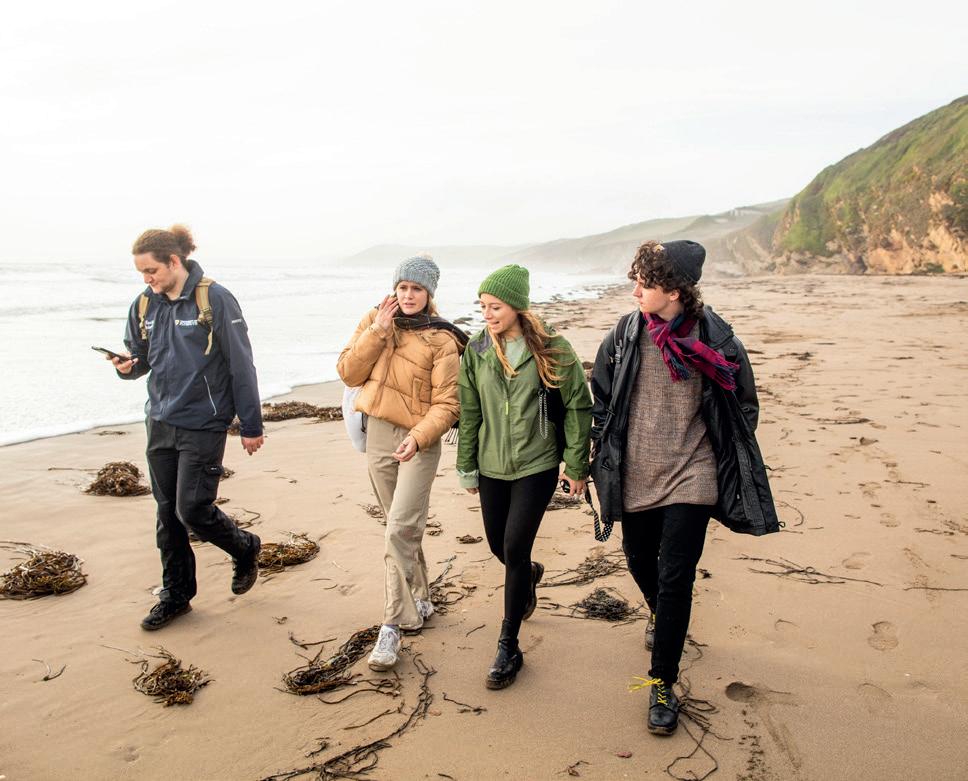
HOW IS UNIVERSITY DIFFERENT TO SCHOOL?
The most obvious difference between study at school and university is that the structure of school hours is no longer there, so you’ll have to develop time management skills and work out your own timetable. How much you study will depend on your course. Expect to burn the midnight oil sometimes, especially around exams, but also plan to have days off.
You will need to learn some new academic skills. There is more for you to think through, and a much wider range of reading. You might not be used to reading around subjects, writing 5,000 words or reading difficult texts. You will need to develop your reading skills: finding the library, getting the books on the reading list, not being put off by the language, and techniques for skim reading. We can support you with all these skills at our Writing Cafe.
At school, support is always there. At university, you’ll have to seek it out – and don’t be afraid to do so. Being independent doesn’t mean you cannot ask for help. You will find very quickly that there is a wealth of support around you that you can tap into should you need it. Our Student Hub is on hand to support you with a range of services.
Finally, university isn’t all about studying! It’s a fantastic opportunity to widen your circle of friends. We pride ourselves on our close-knit student community and there are a vast range of clubs and societies that you can join.
SCAN HERE TO GET STARTED
23
STUDY NURSING
UCAS tariff
104–120 points
Duration 3 years full time (with placements)
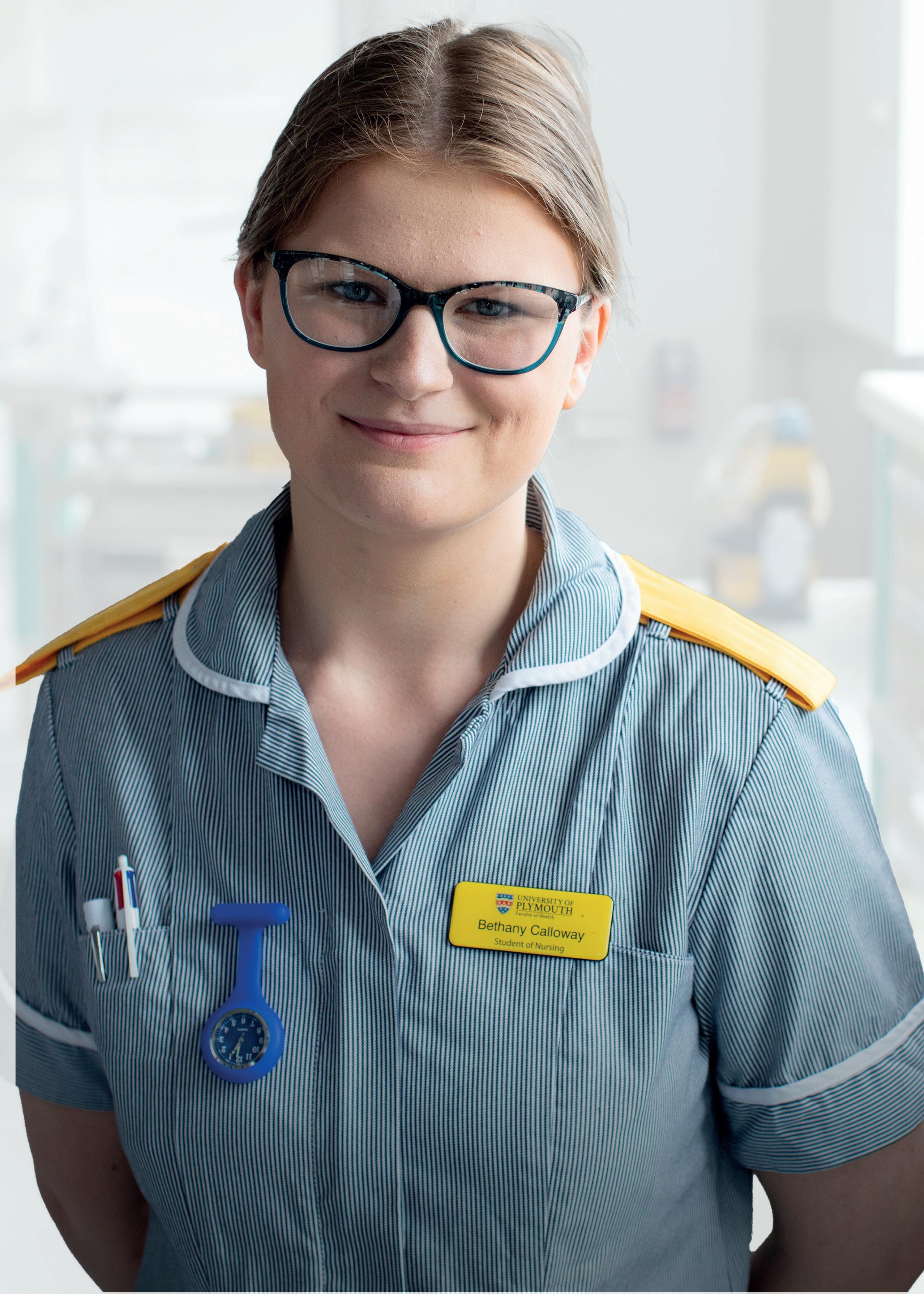
MAKING A DIFFERENCE
BSc (Hons) Nursing (Adult Health) student Bethany came to the University through Clearing. She tells us about her application experience, her course, and finding her Plymouth Night Patrol society family.
24

WHAT INSPIRED YOU TO ENROL ON THIS COURSE AT PLYMOUTH?
I wanted to be in a job that gave me flexibility and a variety of career paths. I liked the fact that Nursing gives you so many options and you can do so many different specialisms all around the world. I have always enjoyed helping people and supporting them to be independent, look after themselves, and be responsible for their own health.
WHAT’S THE COURSE STRUCTURE IN NURSING LIKE?
The course is split into placements and theory blocks. Lectures provide the main bulk of theory and are taught to the whole cohort – so hundreds of students. Our seminars are made up of smaller groups of students, where we do more in-depth activities based off the previous lecture. We also have sessions where we learn skills like cannulation – inserting a catheter – and patient scenarios. It’s a great way for us to learn in a controlled environment in the skills labs, which are set up like a small bay on a ward. In my opinion, placement is the best part, where you work in a community or hospital. We get allocated our placements twice a year. They are a great way for us to practise our skills in real life and apply our theory knowledge to practice. Placements are a crucial part of our training and are where we learn the most. Being in the nursing environment with patients, managing multiple aspects of care, is so important for development.
WHAT HAS BEEN YOUR MOST CHALLENGING MOMENT SO FAR?
I can think of a few moments that have challenged me in different ways, from ethics to practical and mental challenges. Owing to significant staff shortages, there’s not always the capacity to give every patient the level of care I want to – for example, not being able to spend time with those that are dying with no one by their side. Or not being able to give the time to chat to patients. As students, we are lucky to often have a little bit more time than other members of the multidisciplinary team, but we want to do everything we can for our patients.
WHAT WAS YOUR APPLICANT JOURNEY LIKE? WHEN DID YOU APPLY?
I applied for Nursing when I was doing my A levels. Unfortunately, due to COVID, I didn’t sit my A level exams. My calculated grades were high, but the ones I got back
were low and not representative of my capabilities. I didn’t get into my first and second-choice universities. So, on results day when I got home, I immediately started emailing, social media messaging, and calling every university I liked the look of! I had already interviewed for Plymouth and previously been offered a place. They searched my record and offered me a Clearing place, which I immediately took. It wasn’t the university I expected to go to, but it turned out to be the right choice –some things are just meant to be! I have loved Plymouth and would recommend it.
HOW WAS THE CLEARING PROCESS, AND WHAT ADVICE WOULD YOU GIVE TO SOMEONE CONSIDERING APPLYING THROUGH CLEARING?
It was really easy, as I had already applied to the University previously on UCAS, and I had already done all my interviews. I applied through Clearing Plus, which sends out your emails to the university, then they get back to you. They got back to me very fast and it all got sorted really quickly too. My advice is to just get on it as soon as possible. Start having a look around as soon as you know that you’re going to go through Clearing, do a little bit of research if you haven’t already about the university, and be really enthusiastic.
WHAT’S THE VALUE IN APPLYING THROUGH CLEARING?
I think it gives you a second option, another choice. For me personally, there were a lot of emotions at the time having not got into where I wanted to go, and feeling like I didn’t know what to do. But then once you go through Clearing, there are so many options and places at universities that you can choose from – ones that you may not have even explored before. That just shows you it’s not the end. You can get to university, you can do it; it’s just maybe not the way you thought you were going to go initially.
HAVE YOU FOUND A COMMUNITY AT UNIVERSITY?
I am part of the Plymouth Night Patrol society. Members are trained as first responders, and then volunteer on the main student nights of the week as medical first responders. It is a really amazing society to be part of and it is so well organised. They have really good socials too, including a formal awards evening at the beginning of the month, movie nights, pizza socials, and lots more
to come. I’m social secretary for the society, having been involved for three years. The skills I have learnt from the society have been amazing and helped me in my degree.
WHAT HAS BEEN YOUR FAVOURITE MEMORY OF PLYMOUTH SO FAR?
I love so many aspects of Plymouth and have so many memories here. My favourite memory would be the UPSU Summer Ball. It was an incredible event across campus, with famous live acts and fairground rides. It was great fun – an amazing atmosphere and lovely to dress up for. On an everyday level my favourite memories are going down to the sea in the summer and just chilling out with friends in the sun, swimming, having a BBQ until late. In the summer we spend all day outside enjoying the lovely weather and sea. Being so close to Cornwall means we can go just over the bridge to amazing beaches too!
WHERE DO YOU HOPE YOUR CAREER WILL TAKE YOU?
When I graduate, I have already got a job in intensive care. I had a placement there last summer, which I loved. I applied at the job open day at University Hospitals Plymouth NHS Trust and after my interview was offered a job for when I graduate, which is really exciting. I also have an ambition to go into the military as a nurse. I’d also like to work for Médecins Sans Frontières (Doctors Without Borders), working across the world in a variety of areas of nursing care. I have so many hopes for my career. Nursing has so many different specialties, which means I have an exciting career ahead of me.
WHAT ADVICE WOULD YOU GIVE TO ANYONE INTERESTED IN STUDYING TO BE A NURSE?
Look at loads of different universities so you’ll know which one is right for you! I went to eight different university open days before I decided which ones to apply for. If the university has Unibuddy, you can chat to current students online and find out more about your course. I would also advise care experience because as a nurse it’s all patient care, so it’s good to get some experience before you begin. Most of all, if you want to do it, do it! It is amazing and you will have so many great experiences and learn so much. We need nurses now more than ever before.
25
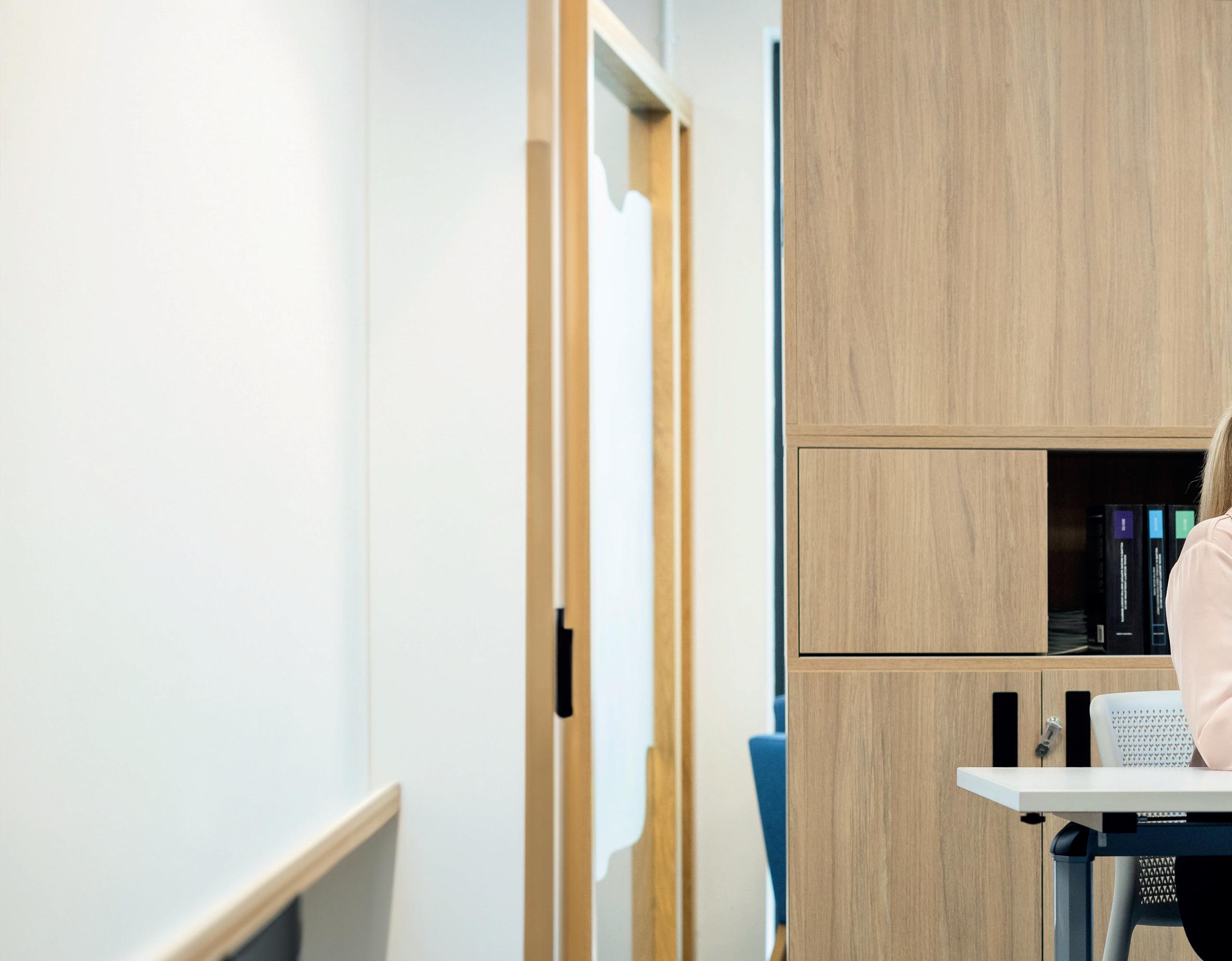
JASMINE’S STUDENT JOURNEY
I
applied through Clearing, but
ultimately I chose Plymouth because I grew up here, and I absolutely love the city for its closeness to the ocean and nature.
Jasmine, LLB (Hons) Law student and Events Officer for the University of Plymouth Law Society (UPLS)
CHOOSING PLYMOUTH
The city has everything that a student could need, including a good nightlife and everything is very close together, which is super convenient. I was particularly interested in Plymouth’s law course as I liked the look of the modules, the opportunities provided by the Law Society and the option to gain experience working in the Law Clinic, providing pro bono legal advice to my local community.
I did consider moving away for university, but the course at Plymouth was hard to turn down. Still living at home while studying has certainly given me a different experience to other university students but, from my point of view, it hasn’t had any negative affect on my experience at all. I would even say the contrary, the South West is a beautiful, welcoming place and I wouldn’t want to leave. I get to retain my home comforts while still experiencing the fun parts of being a student: partying, having lunch with friends, attending lecturers and bettering myself. If you are considering living at home for university, do, you will not be at a disadvantage in any
way. I am very happy with my decision to study here!
UNIVERSITY LEARNING
I found the transition to university to be smooth. My lecturers were very helpful with this, as they thoroughly explained what was to be expected of us as students, including structuring essays and referencing. They are always available to answer questions and provide any support. I enjoy the way that learning is structured on my course, as modules are taught 75% via lecture and 25% via seminar. A lecture is a large group session where the substantive content of the module is taught. A seminar is a smaller group session where you apply what you have learned to problem scenarios, and they are very enjoyable and helpful for assignments and exams.
I learned to write an assignment by turning up to all of my lectures and listening carefully to my lecturers’ instructions – that really is the trick to mastering assignments! Each lecturer is slightly different and has slightly different expectations, so I take
note of this and tailor each of my assignments to the standard that they expect. I also take my time with my assignments and start the research early so that my writing is interesting, in-depth and not ‘left to the last minute’. This method and hard work have done me well so far, as well as help from my lecturers and peers whenever I need it.
MY CAREER ASPIRATIONS
During my first year, I knew that I wanted to become a lawyer, but I struggled to decide whether I wanted to be a barrister or a solicitor. However, after obtaining advice from the Careers Service and participating in various work experience placements, I am now set on becoming a solicitor in a Plymouth firm. I plan to undertake the Legal Practice Course (LPC) full time upon completion of my degree and hope to begin a training contract in September 2025. I cannot praise the Careers Service enough, as they have given me unlimited advice on my career options, CV and applications. Through the Careers Service, I have also attended several skills development workshops and currently
26
26
STUDY LAW
UCAS tariff
112–128 points
Duration
3 years full time (+ optional placement)

work with a personal mentor, who I met through their mentoring programme.
MY ACHIEVEMENTS SO FAR
I would say my biggest achievement so far would be being elected as a committee member for the University of Plymouth Law Society. Through this, I have really developed as a person and gained some amazing experience. A few other experiences have included being awarded the Gordon McLeish prize for outstanding performance and achieving the highest grade in one of my modules. I felt so proud of myself for winning this award, and it was also a real feeling of relief, that all the hard work I was putting in had paid off. Another amazing experience was when I won the Law Society’s ‘Client Interviewing’ competition, which was judged by a local firm and secured me a week of work experience at the same top Plymouth firm.
THE FRESHERS’ EXPERIENCE
For me, Welcome Week was really fun. I chose the events that I wanted to attend via the Students’ Union website. These included a Zoo Party, a ‘House Party’ in a
club and a neon party. Throughout Welcome Week, there are events to suit anyone’s interests, including both sober and events with alcohol. The University also puts on a Freshers’ Fair and a Societies Fair which are both so much fun and a good way to meet new people (and get free food and Freshers goodies). I made friends with some girls I met in one of my first few lectures, we were put into a group together and we have been friends ever since! There are several ways to make friends on campus, including joining societies and attending events held by the SU.
FINDING MY PEOPLE THROUGH THE LAW SOCIETY
Becoming a member of the Law Society is a must for all aspiring lawyers, it provides all members with the opportunity to network with legal professionals, participate in legal competitions to build their skills and go on trips to build their legal knowledge. For example, in December, the UPLS held its annual Cheese and Wine Networking Evening at The Box when 150 professionals attended
and passed their wisdom and advice to 120 Law Society members. Through this event, I obtained legal work experience and made some connections with potential future employers. I have also participated in several competitions, including mooting (which is like a mock court, legal argument competition), negotiations and client interviewing.
The Law Society also helps its members to make friends and have fun. Outside of their studies, it hosts regular socials and also has a football team and netball team.
Being a committee member for the UPLS has helped me to build my skills and grow my confidence. Through organising the society’s events, which has not been without its challenges, I have developed professionalism, negotiating skills, teamwork, organisation, time management, public speaking skills and so much more.
27
LIVING IN BRITAIN’S OCEAN CITY
Hear from our students about their favourite places to spend their time in and around Plymouth.
“Rame Head is one of my favourite places to go next to Plymouth. You can either walk there along the coast from Plymouth, or drive/ get a bus. I have seen a number of sunrises at this place, and every time, it is so different. In the quiet mornings, finding yourself alone (or with your best friends), surrounded by deer and horses, listening to birds while the sun comes up from the ocean on your left, there’s a true sense of magic. You could probably come here every day and each time will bring a different experience.”
Louise,

BSc (Hons) Marine Biology and Coastal Ecology student

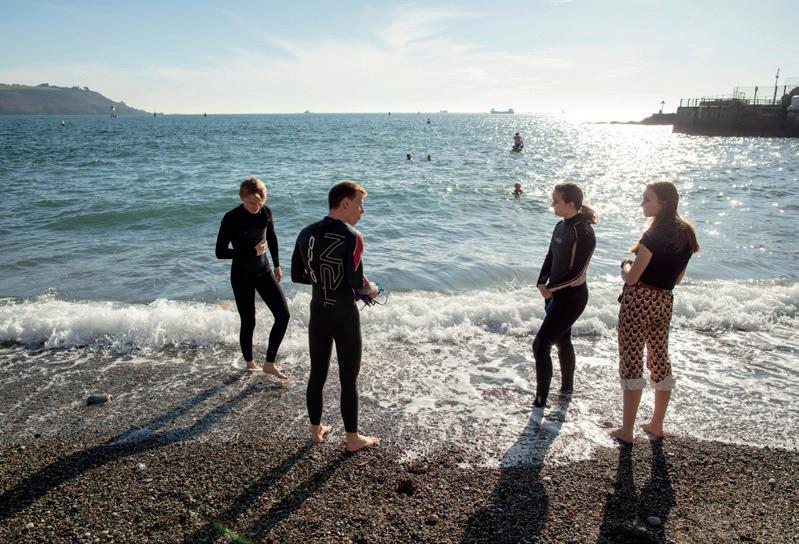
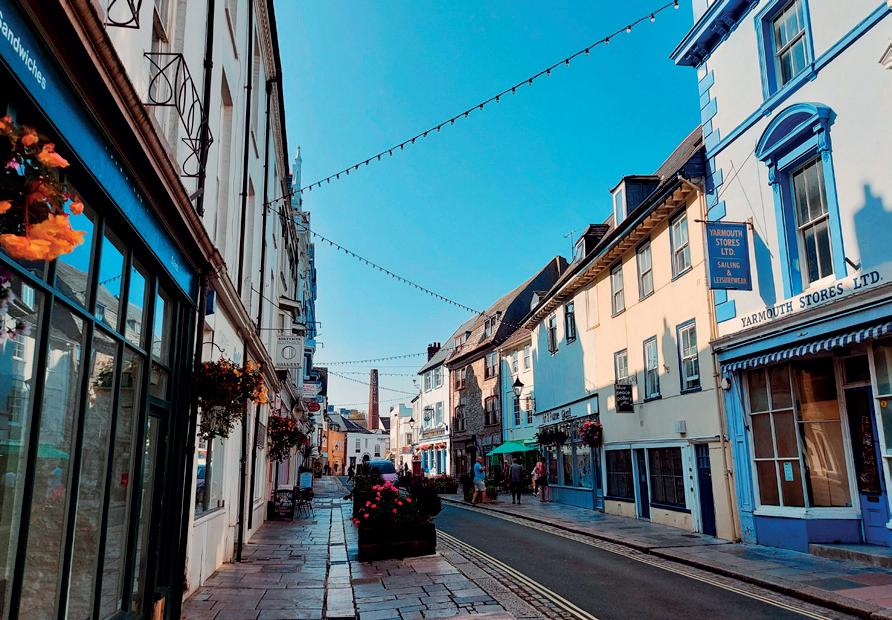
“The Barbican is a new favourite place of mine, not only because of the amazing views, but also because it has history attached to it which I loved discovering. It is also a great spot for late-night walks when you just want to think.”
Jessica,
BA (Hons) Politics and International Relations student
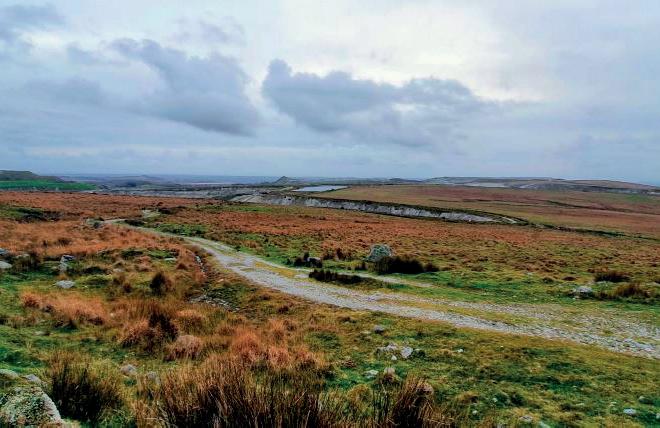
DARTMOOR NATIONAL PARK IS ONLY A 30-MINUTE DRIVE FROM THE UNIVERSITY
“There are many places to go swimming in the sea around Plymouth. You can pretty much enter the water anywhere you like, along the Hoe, the Barbican, and surrounding beaches. Just be careful you’re not swimming near shipping routes and someone knows where you are!”
Hannah,
BSc (Hons) Marine Biology and Coastal Ecology student

28

FROM THE CITY THAT’S ALIVE WITH THE SPIRIT OF DISCOVERY TO THE BREATHTAKING LANDSCAPES OF THE COASTLINE AND COUNTRYSIDE, THE SOUTH WEST IS A REGION THAT LIVES UP TO ITS REPUTATION AS A PLACE TO LIVE THE LIFESTYLE YOU WANT.
“Plymouth is so beautiful, it’s very difficult to choose one favourite place, as most places I absolutely love! The top locations in Plymouth for me are the seafront, Sutton Harbour and Devil’s Point because being by the sea is actually the best thing ever! I love going to watch the sunrise by the sea as it’s just so tranquil and such a great start to the day!”
Christina, BSc
(Hons) Biomedical Science student
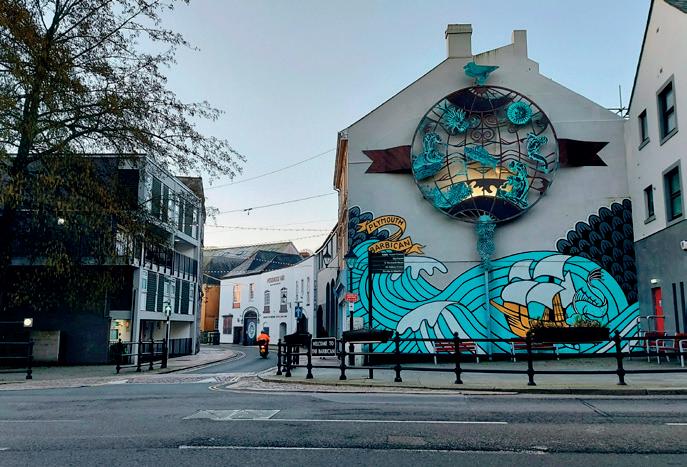
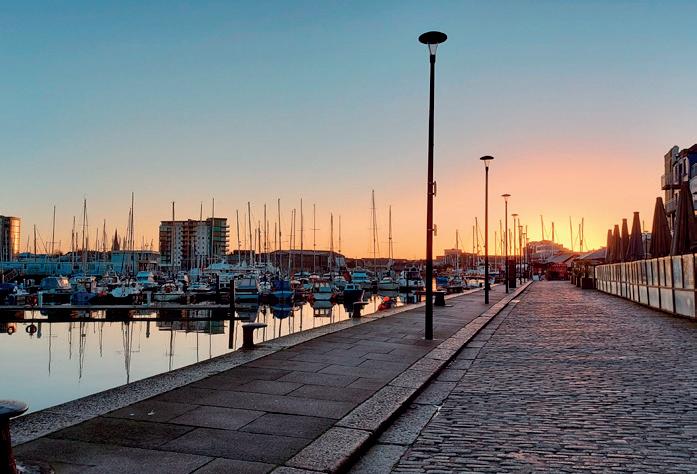

“The majority of Plymouth’s student accommodation, halls and houses are within a 15-minute walk of the University, which is one of the most convenient things for me. This means that it’s so easy to get to university, to see your friends at their places or to get into the city centre too.”
Lily, BA (Hons) Product and Furniture Design student


“The great thing about studying in Plymouth is that you can see the sea pretty much all the time! One of my favourite things after a stressful week is to walk to the Barbican for fish and chips, which you can follow up with a hot chocolate sitting on the Hoe.”
Sumbel, BMBS Bachelor of Medicine, Bachelor of Surgery student
29
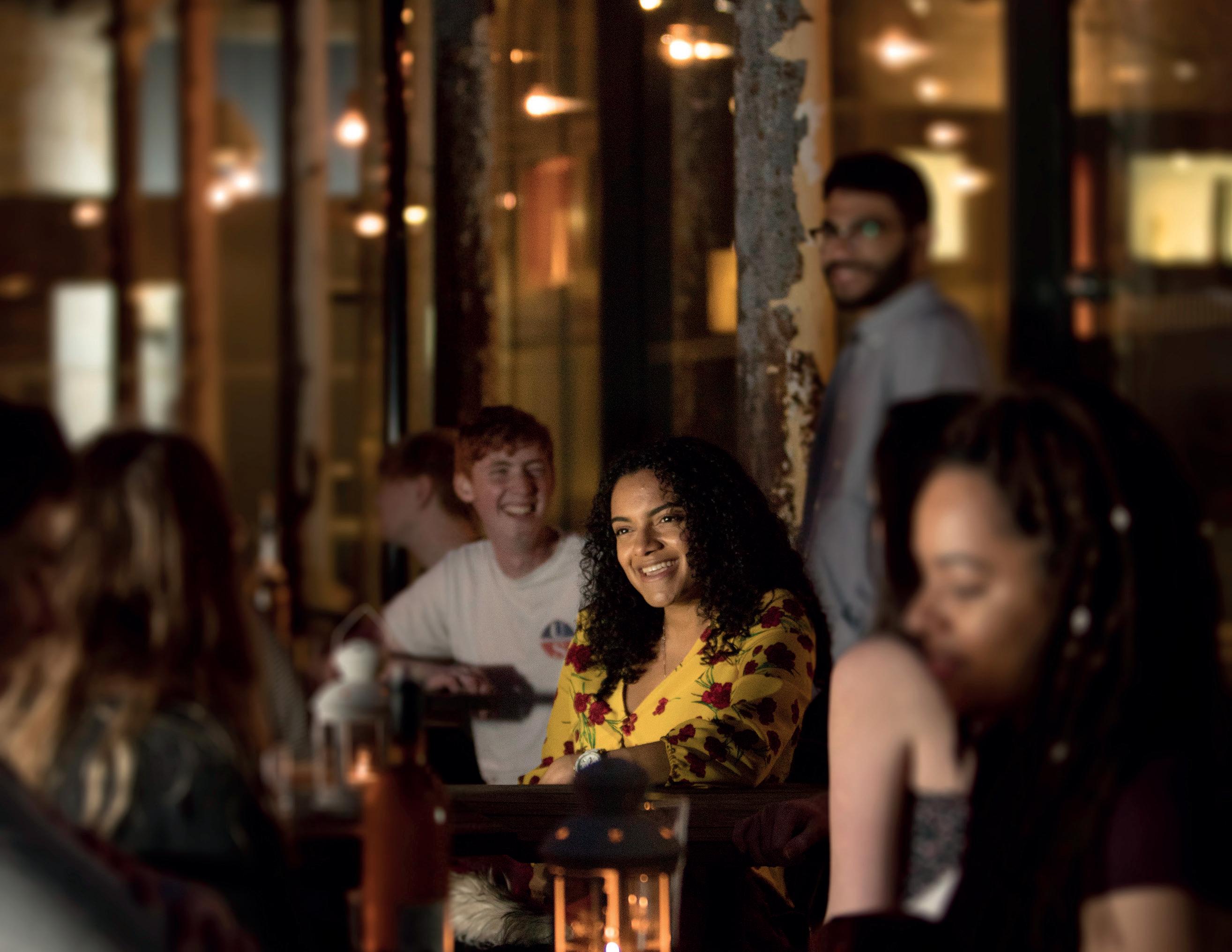
“Plymouth is a top student city, and as a result it has a vibrant and active nightlife. The SU is at the heart of it all hosting live music gigs and club nights, while student societies keep things fresh with a variety of themed house party events. For a change of pace, the Barbican offers a range of live music venues nestled in its bars and pubs. My go-to hotspot? The Depo. This small club is growing in popularity, attracting popular DJ’s such as Sammy Virji and SHY-FX.” Jackson,
BA (Hons) Architecture

“I’m part of the Rounders society where I’ve made so many friends and it’s been really nice to meet other people around the uni (not just my course) through nights out with them. We go to the Students’ Union and have fun every Saturday and Wednesday.”
Lois,
BSc (Hons) Business Management
PLYMOUTH NIGHTLIFE
PLYMOUTH STUDENTS’ UNION
was awarded Best Student Venue in the City and Highly Commended Best Late Night Venue (Best Bar None 2023)
“We have such great nightlife here. My favourite is Union Street which has loads of bars, pubs and clubs (the best bit!) and it’s all walking distance from campus, so super easy to get to.”
Ed, LLB (Hons) Law

30
SAFE TAXI SCHEME
In partnership with Need-ACab, UPSU runs a safe taxi scheme for our students, which can be used anywhere in the city on a night out. If you’ve run out of cash or lost your card, you can show your student ID and pay the next day at the SU!
WATCH THE SUMMER BALL AFTERMOVIE
Get a sneak peek in to the annual UPSU Summer Ball. This could be you next year!

“There’s loads of amazing bars you can go to, there’s even one in the middle of campus James Street Vaults (JSV), with lots of drinks to choose from. There’s a great club in town called Fever that has afrobeat parties once every three months which are always really fun. You can also party at Revolution every night if you wanted to, there’s always something going on there!”
Victoria,
LLB (Hons) Law

“My go-to place is the Students’ Union! There’s fun late-night events on most days but the one I love the most is Jam House, which takes place every Thursday. It’s Plymouth’s biggest open mic night and if you like live music it’s the place to be.”
Oliver, BA (Hons) Illustration
31


Criminology student Laura tells us why going through the Clearing process was the best option for her.
WHY DID YOU GO THROUGH CLEARING?
DID YOU APPLY LATE OR NOT GET IN TO YOUR FIRST CHOICE UNI?
As an international student, I was waiting for my residency card to arrive, and for my first choice of university this seemed to be a problem. Despite receiving an unconditional offer, they rejected me, so I applied via Clearing with Plymouth. They were incredibly understanding of the obstacles international students can sometimes face, and explained that they would hold my application as pending up to the point when my residency permit arrived. I was then able to fully access my course!
HOW WAS YOUR EXPERIENCE OF THE CLEARING PROCESS?
When August came around, I called the University helpline and explained that I was planning to apply. I didn’t know much about the process, but the adviser was very clear and understanding, and managed to guide me through my options. They were so positive about my opportunities at Plymouth that I instantly felt happier and excited. I actually remember it to be a great experience; it was much easier than I expected it to be.
“Working in the crime scene gives me the opportunity to learn practically. We study motives and connect them to the crime and the physical evidence, for example fingerprints, weapons and CCTV. Learning about criminal justice gives me inspiration to learn more about society and how relevant this field is for our everyday lives.”
WHAT ARE YOUR CLEARING TIPS?
To ask for help, going through Clearing can seem scary, but the University has a team of people who will be able to advise you on the actions to take. If you’re thinking about it, take the risk! I’d say be prepared to go through the process on results day. Whether you’ve done really well or not as you expected, there are other routes you can take such as Clearing.
32

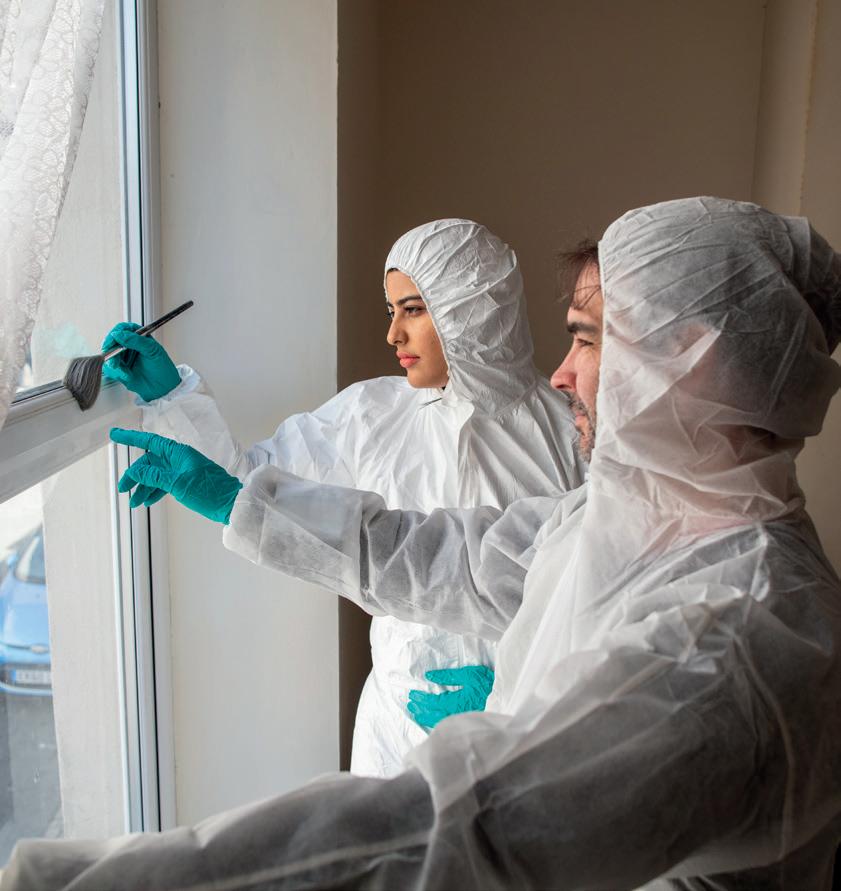
HOW DID YOU SETTLE IN TO UNIVERSITY?
I settled in well. The Accommodation team allocated me a room in Radnor Halls, despite how late I applied. It was an easy process: I came to pick up my keys and was also able to have my parent help me move in, which was nice as it made moving in so much easier. The University is surrounded by shops, bars and restaurants – perfect for a student. Having the seafront close by is also very nice; I love going for walks there. My course, Criminology and Criminal Justice, has been so interesting to me that I can’t imagine myself doing anything else. I’d advise anyone starting their course to enjoy it all. After the first week, university all becomes so much clearer to you; friends start to come along, and in time you will settle down and enjoy student life.
HOW HAS THE UNIVERSITY SUPPORTED YOU?
The University has always been here for me – first with my residency status, and then from helping me through Clearing and the accommodation. These small details have made my whole experience so much easier than expected. In terms of support on my course, my lecturers and seminar leaders have been here to give me advice every step of the way. I have also received library support on essay structures and guidance.
WHY DID YOU CHOOSE TO STUDY YOUR COURSE?
I have always had an interest in criminology, and after doing some research on Plymouth’s course, I found some past experiences from Criminology alumni students which convinced me.
UCAS tariff
104–120 points
Duration
3 years full time (+ optional placement)

I would like to work for MI5 in the future and I am hoping that my degree will allow me to do this. I’d recommend coming to an open day if you can, which will give you more of an insight into your chosen course and the University.
WHAT WOULD YOU SAY TO SOMEONE WHO IS CONSIDERING GOING THROUGH CLEARING?
Go for it! For me, going through Clearing wasn’t planned until it happened. I was given the chance and received a place, and when I think about it, I know that being here is best for me. I don’t see myself as comfortable anywhere else. It could work out for you as well as it did for me!
33 STUDY CRIMINOLOGY
FINDING A NEW DIRECTION
Hi, my name’s Josh. I’m studying Computer Science with Foundation Year at the University and I joined through Clearing. Through college I studied music, obtaining two diplomas in Music Audio and Technology, but I actually had my mind set on going into the ambulance service as a paramedic. This all changed when the NHS went on strike and suddenly, I found myself without any training to attend and no idea what to do next.
This is where the idea of doing what I loved and going to university came into play. I never thought of myself as being smart enough for university, and I thought that I had missed the sign-up date, but after looking at the University’s website, I found out more about the Clearing process and decided to take my chances. I was successful, and it’s the best thing I have ever done.
With my start in audio technology, I decided a more computing-based subject would be best for me and I ended up deciding to study Computer Science with Foundation Year, so I could gain a better understanding of how software is made, rather than just using it.
When I applied via Clearing it happened so quickly, it was all over in about two weeks. After calling the University, I was then able to apply like any other student would and soon enough I had received a letter saying
I had got a place, which of course made me incredibly happy! From there, I received emails about accommodation (which was a breeze) and all the information on my course.
Throughout my first year here, I have been treated no differently to any other student at the University. The topic of how we got into uni doesn’t come up very often but when it does, and I explain I had to go through Clearing there is no judgement or bad comments at all, everyone here is in the same boat.
In the future I want to go into cyber security, and I want to work in the agricultural sector. With farmers using more and more technology year-on-year, I want to be able to help protect their online presence and data, so that the people who feed the country are not at risk of losing the money and the valuable crops they grow.

A TYPICAL DAY IN MY STUDENT LIFE
10:00–10:45 Get ready for the day 10:45–11:00 Make my way to my lecture/lab 11:00–13:00 Lecture 1 13:00–15:00 Lecture 2 15:00–16:00 Break 16:00–20:00 Go home to do coursework, tests or quizzes 20:00–22:00 Meet up with the Ski Society and hit the slopes 22:00–23:00 After ski drinks
34
STUDY COMPUTER SCIENCE WITH FOUNDATION YEAR
UCAS tariff: 32–48 points
Duration: 3 years full time (+ optional placement)

MY TOP THREE TIPS FOR CLEARING:
STAY CALM. There is time, and the University will make time for you.
KEEP COMMUNICATING. Keep in touch with the University and follow up with your application if you need to.
MAKE SURE YOU KNOW WHAT YOU WANT TO DO. There is time to apply, but you may not have loads of time to change course.
35
BRODIE’S CLEARING STORY
Anthropology student Brodie shares how Clearing was his opportunity to stay local and find the right university for him.

WHY DID YOU APPLY TO THE UNIVERSITY OF PLYMOUTH?
I applied to the University because I’m from Plymouth, so I know the area and the city, and because I’d visited lots of different universities and I hadn’t really clicked with them or enjoyed the cities, like I enjoy it here. I thought, “If I’m really missing home, and it has a good university, then why don’t I just stay?”.
WHY DID YOU CHOOSE TO APPLY THROUGH CLEARING AND WHAT WAS THE PROCESS LIKE?
I was applying to other universities and was kind of shopping around trying to find the one that fit me. I’d already gone through the whole application process on UCAS, and once I had figured out that I definitely wanted to study at Plymouth, it was
so late that I then had to apply at the last minute. Applying through Clearing at the University was easy. I phoned the hotline and asked if they still had space on the course and they said yes! Then it took me maybe a week in total to go through Clearing, then apply and deny my other offers.
WHAT WOULD YOU TELL SOMEONE WHO WAS CONSIDERING APPLYING THROUGH CLEARING AT THE UNIVERSITY?
I’d say it’s not as difficult or as anxiety inducing as it might seem at first. For me, it was a mixture of feeling weird and almost a failure, because it was really last minute and rushed. I was going through a lot of thinking about different courses that I wanted to do. Of course it was a lot more last minute than I ever intended, and it
was very up in the air until I started the application process. But once I started it was really simple, and it took a massive weight off to realise that applying through Clearing was much easier than I thought it was going to be.
DID YOU ALWAYS WANT TO STUDY ANTHROPOLOGY?
Anthropology was the kind of course I wanted to do, I just didn’t know it yet. I started off interested in the arts. I did an arts foundation course, then I moved to graphics and then to filmmaking. I realised whilst I was studying filmmaking, that I was really interested in documentary film – I was fascinated in politics, society and people, how people interact with the world and the socio-political situation going on. So then, I ended
36
STUDY
UCAS tariff: 104–120 points
Duration: 3 years full time (+ optional placement)
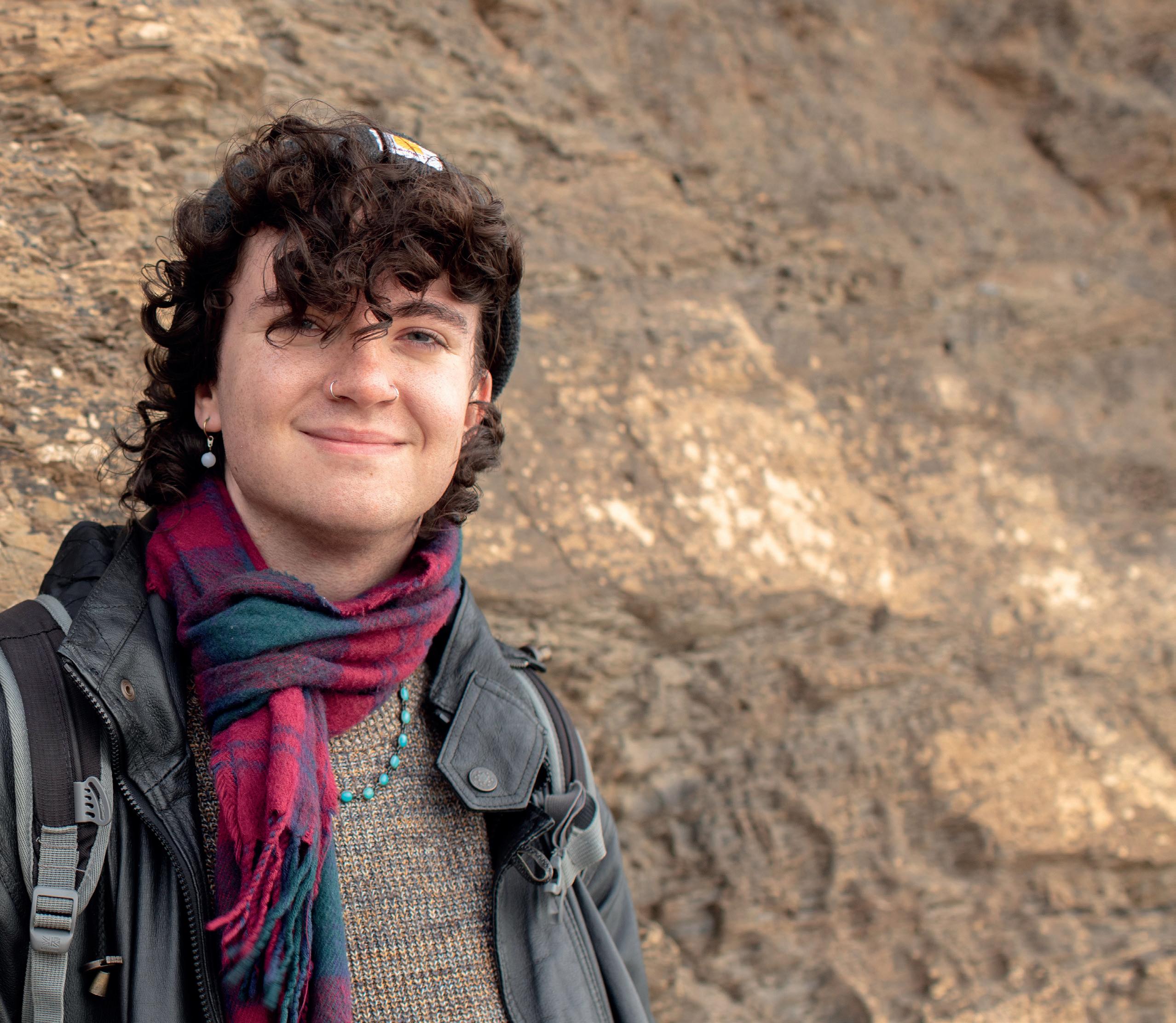
up applying to study politics and sociology somewhere else, but it still wasn’t right for me. However, once I started looking at the University’s website and found anthropology I thought, “Oh, that’s exactly everything I’ve been looking for!”.
CAN YOU TELL US MORE ABOUT THE COURSE?
Anthropology is technically the study of human cultures. It’s a hugely broad topic. We look at different societies, different cultures, and try to either find common themes or look at the underlying themes and what drives them. We can look at witchcraft, symbolism, ethnicity, race, capitalism, all of that, but a lot of it is focusing on the people themselves.
HOW DID YOU MAKE FRIENDS AND MEET PEOPLE WHEN YOU STARTED UNIVERSITY HERE?
Making new friends is a big part of uni and the first friends I made were my course mates. After a while I started making friends through societies, and I’ve met most of my best friends this way. I’m part of the Rock and Live Music Society. I enjoy the rock and live music aspect of it, but predominantly it’s the people. It’s quite a close-knit society and it’s very supportive. Everybody is friendly and welcoming, and it’s very active; we do a lot of activities in and around town. It’s basically just a community of very lovely people and it’s been great to get to know them.
WHAT SUPPORT HAVE YOU RECEIVED FROM THE UNIVERSITY OF PLYMOUTH?
I have received support from the Careers Service! As part of my course, we go to talks with them and attend CV workshops. A lot of my friends have made use of the Career Service too.
WHERE DO YOU SEE YOUR CAREER GOING AFTER GRADUATION?
I’m really interested in looking at going into the museum sector when I graduate, but I’ve also only recently started thinking about land management, or something to do with conservation – working with people in communities and advising how they can best manage their wild spaces and reforesting.
ANTHROPOLOGY
37
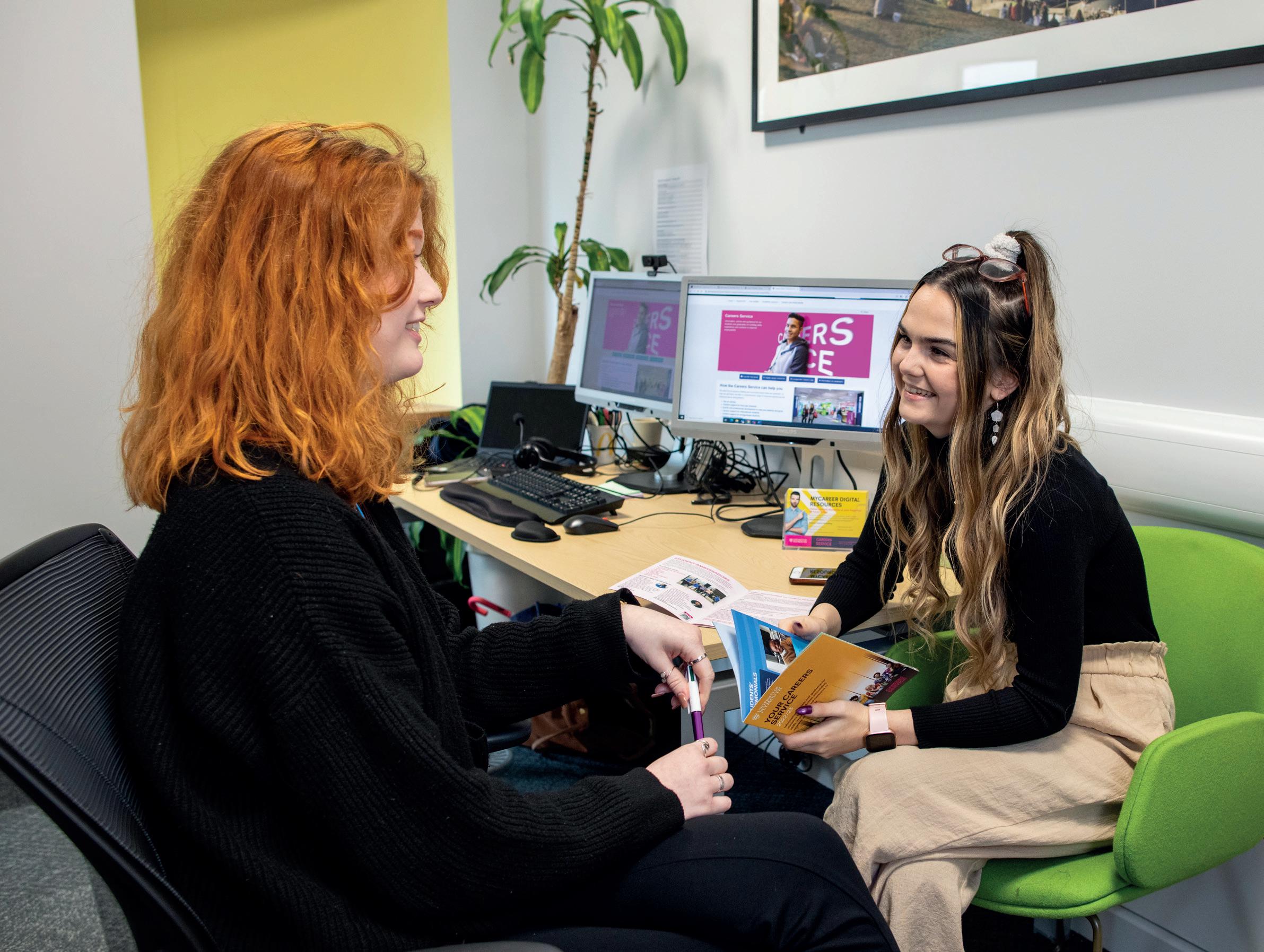
THE UNIVERSITY HOLDS A PART-TIME JOBS FAIR, WITH OVER 30 EMPLOYERS COMING ON TO CAMPUS TO RECRUIT STUDENTS EACH YEAR
WHERE WILL YOUR DEGREE TAKE YOU?
SUPPORT
The Careers Service offers support during your time at uni, after graduation and beyond. The team can help you secure part-time work, work experience, graduate positions and more! If you need advice on interview preparation or looking for employment, or need help with your CV, they can take you through the resources and guide you to the next step. You can also arrange a scheduled face-to-face or virtual appointment, and there is no limit on how many times you can see our careers advisers.
EVENTS
The Careers Service runs a wide range of employer-led careers and recruitment events to help you to interact with employers, along with a programme of skills development workshops. These include career fairs, employer drop-ins, and insight panels for students wishing to explore placement, graduate and part-time work opportunities, along with workshops on interview success, assessment centre advice and tips for job searching.
MENTORING
The University offers a career mentoring programme to support you on your career journey. Students are matched with industry professional mentors who give their time and knowledge to support students. Mentors can help students gain unique insights into their desired careers, learn about networking opportunities, increase their skills and undertake mock interviews, giving them a competitive advantage in the job market. Programmes run over six months, designed to fit around your studies, and any undergraduate student can apply.
38
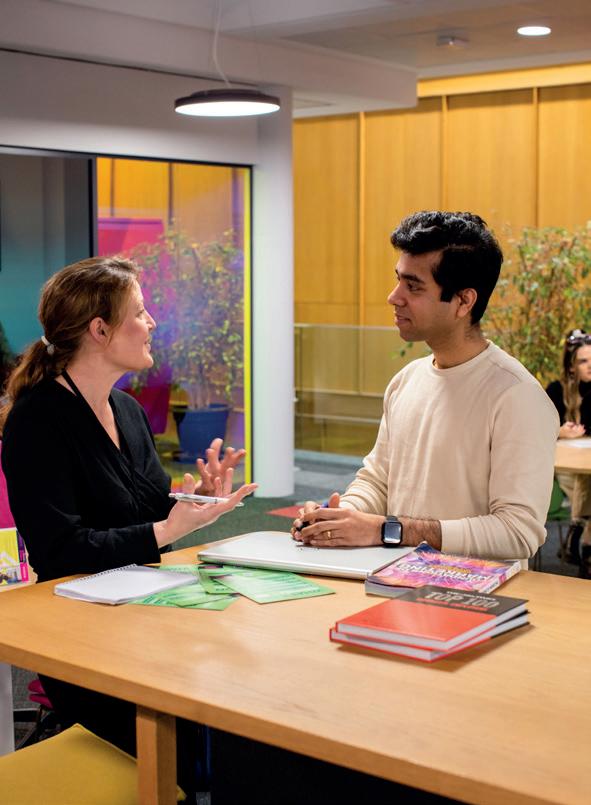
PLACEMENT AND WORK EXPERIENCE
Undertaking a placement in your course, or gaining other work experience while at university, will greatly improve your chances of achieving the graduate role that you want.
There are a number of opportunities to gain work experience – through our emerging micro-internships programme – of up to two weeks within the work environment. Careers education and activities are embedded as part of your academic programme. Our careers consultants work in partnership with your lecturers to design and deliver tailored career development activities within your course. These range from talks and workshops to competitions, helping you to bring your future into focus as you study… make sure you take advantage of them!
MYCAREER
As a student and for as long as you need it after you graduate, you have access to myCareer, our innovative online system, supporting you to develop your skills and career. This gives you the chance to find part-time, placement and graduate vacancies; book onto workshops, webinars and career fairs; and find appointments.
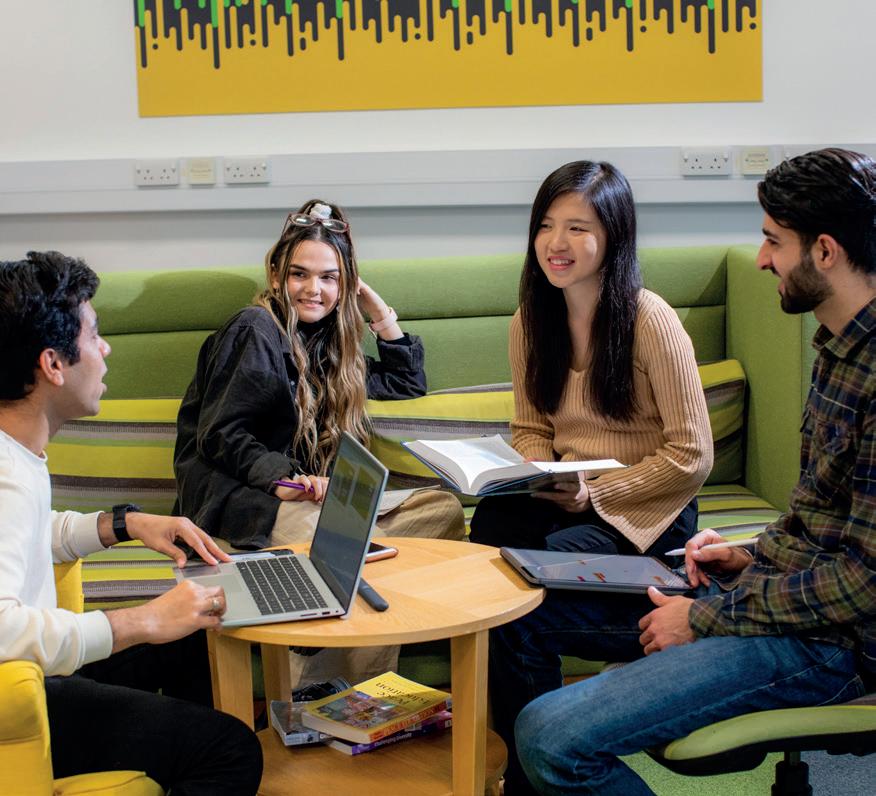
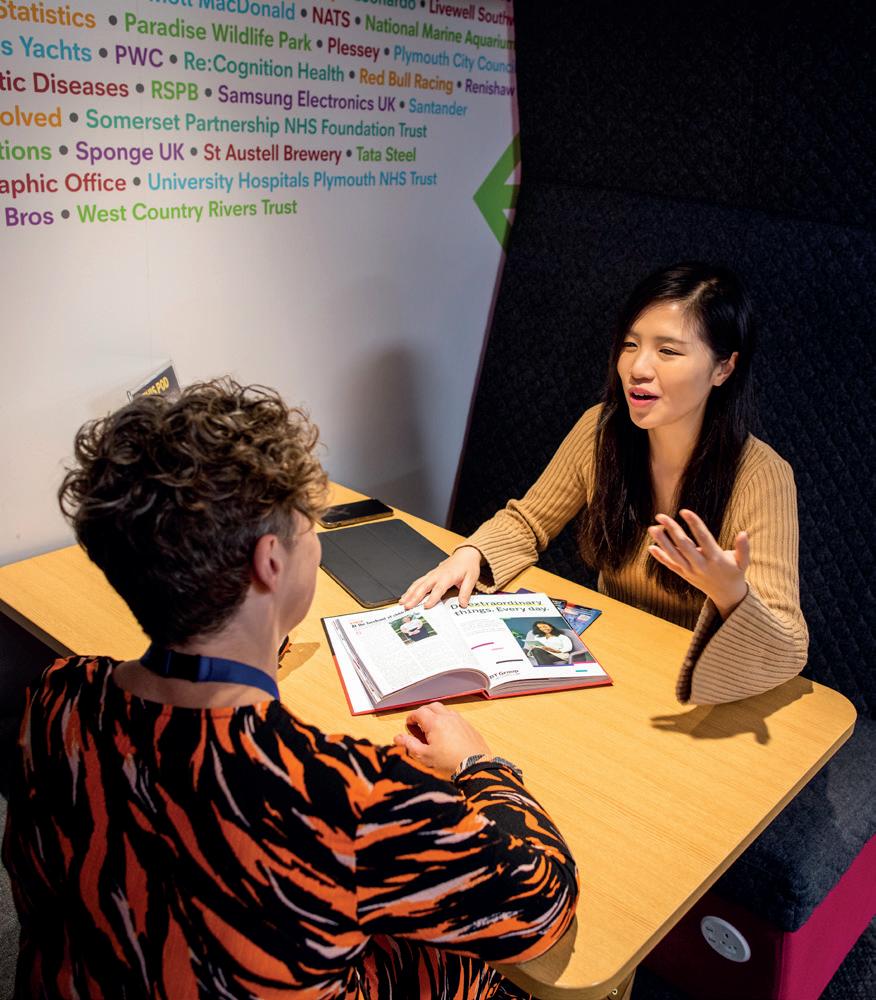
DIGITAL RESOURCES
myCareer Digital Resources has a whole host of activities, tools and videos which can help you build your employability skills. Using this, you can:
• get CV feedback using CV360
• understand the interview process, take mock interviews and get advice from employer videos using our interview simulator
• use our psychometric and aptitude tests to practise some of the most commonly used assessments to improve your chance of performing well in the real thing.
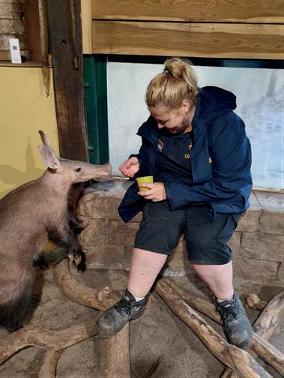
“The placement allowed me to put into practice the modules I did in the first and second year, and gave me the experience and connections I needed to get a job after graduation.”
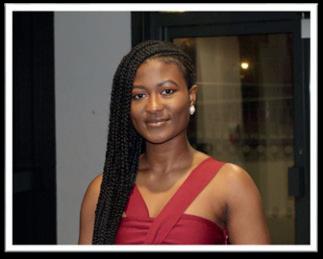
“Being part of the mentoring programme helped me gain a clearer insight into what life will be like after university, and how to make myself stand out in a work environment and when applying for jobs. I would highly recommend this course to anyone looking for potential career paths after graduation and looking to improve on professional skills.”
Sylvia, BEng (Hons) Electrical and Electronic Engineering student
Rachel, BSc (Hons) Animal Behaviour and Welfare student
39 GET IN TOUCH! Follow us on , or @uniplymcareers Email: careers@ plymouth.ac.uk Tel: +44 (0)1752 587456
MY PLACEMENT
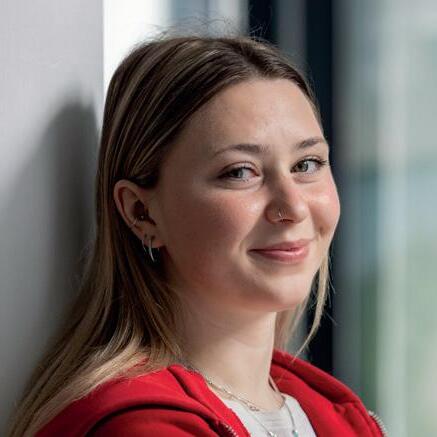
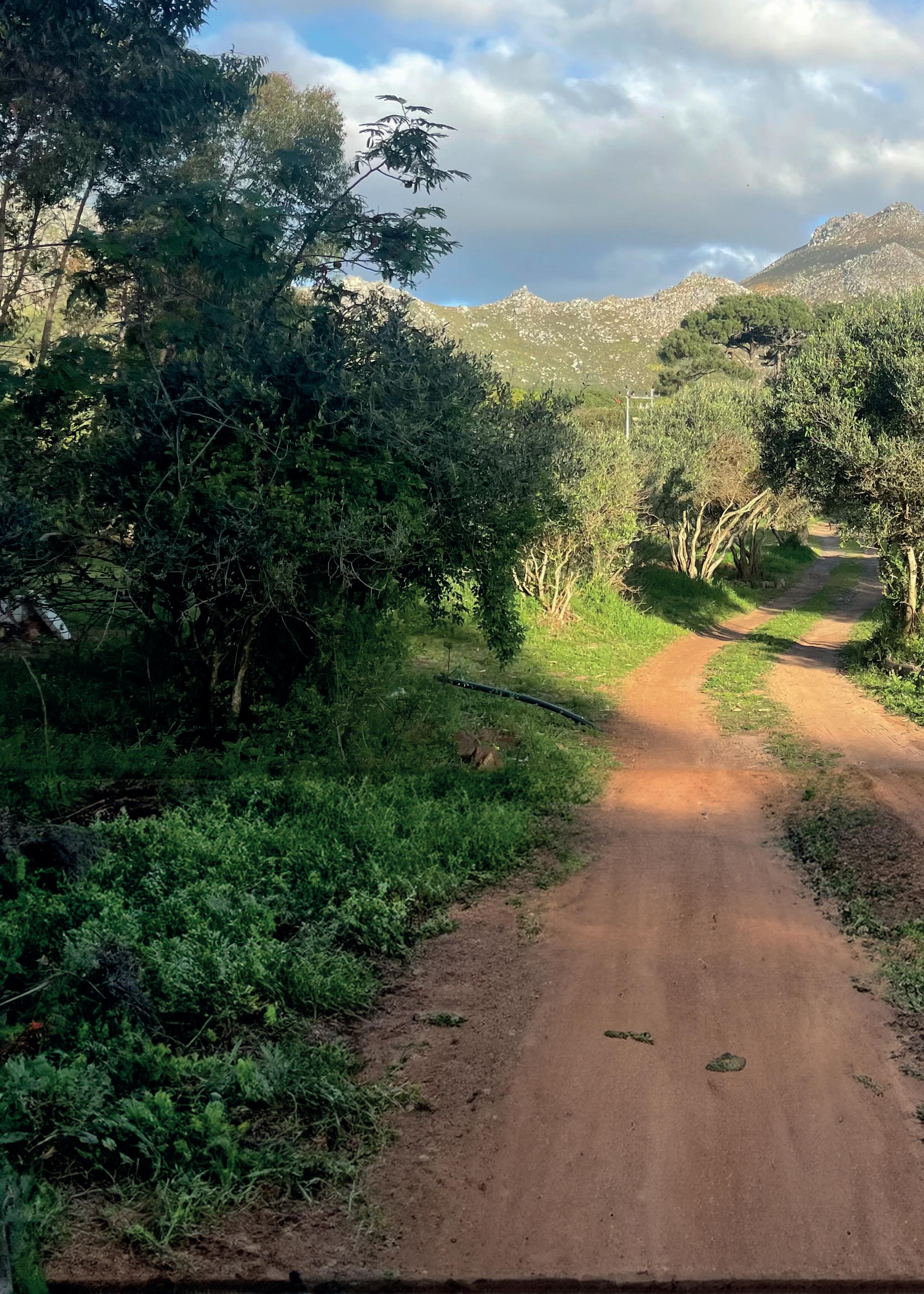
BSc (Hons) Psychology student Bella shares how her time in South Africa left a huge impact.
I have always been interested in psychology, and the notion that everyone has a life as vivid and complex as my own. This fascination led me to a desire to understand our individual quirks and want to contribute to the battle to improve mental health. Plymouth was an ideal location for me, as not only does the curriculum provide a wide range of psychological topics, but the city has so much to offer from the endless outdoor activities to the nightlife scene.
The course has a great balance of practical work and lectures, with a typical week consisting of four lectures and two workshops, each lasting two hours. During the semester, we study around ten different psychological phenomena and create two experiments, which we design,
carry out, and analyse ourselves. This allows for a more hands-on experience and an opportunity to explore different interests.
PRIMARILY, THE MAIN REASON I CHOSE TO STUDY PSYCHOLOGY AT PLYMOUTH WAS BECAUSE IT WAS ONE OF THE FEW UNIVERSITIES THAT OFFERED THE OPPORTUNITY TO COMPLETE A PLACEMENT ABROAD.
During my placement in South Africa, I participated in many incredible projects, including running a holiday programme, organising trips and fun activities, as well as partnering with other organisations, to help educate the children on topics not taught in schools. For example, I helped organise a visit from a company called ‘Indoni Yamanzi’,
who educate young women about their menstruation cycle and attempt to break down stigma and the abundance of misinformation the children have received.
It was amazing to feel as though I have made even a minute impact in these children’s lives and to at least provide them all with the love and attention they deserve.
I found this incredible placement online through an organisation called ‘Roots’, which organised my entire experience (including accommodation and volunteering), alongside providing additional mentoring and support. My research for the trip was heavily supported by the University staff, who are extremely approachable and always ready to help. In particular, the Careers team held many
40
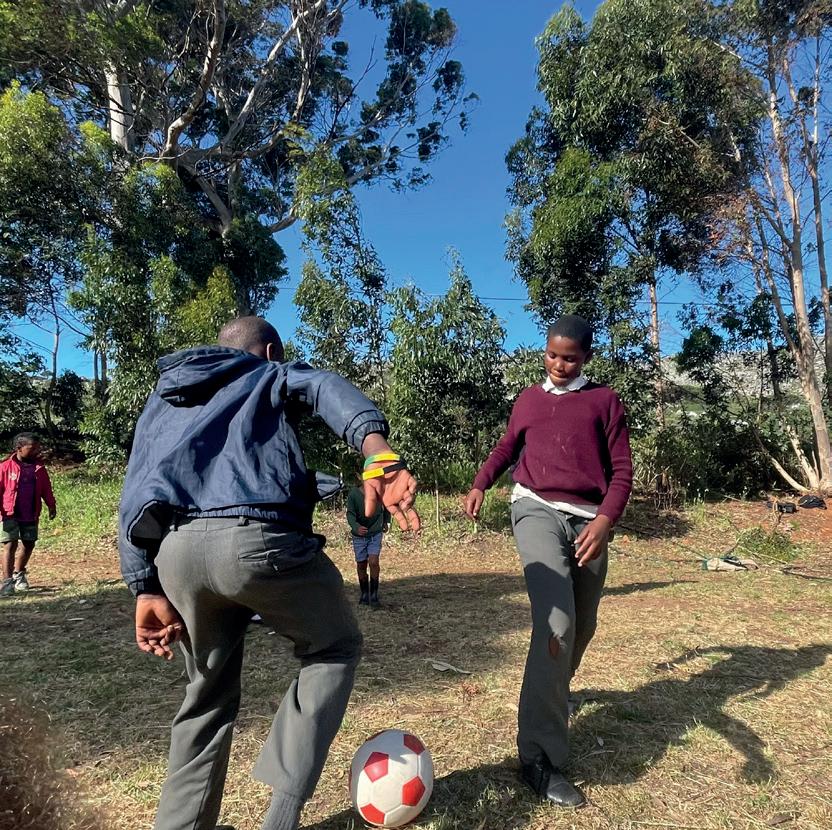
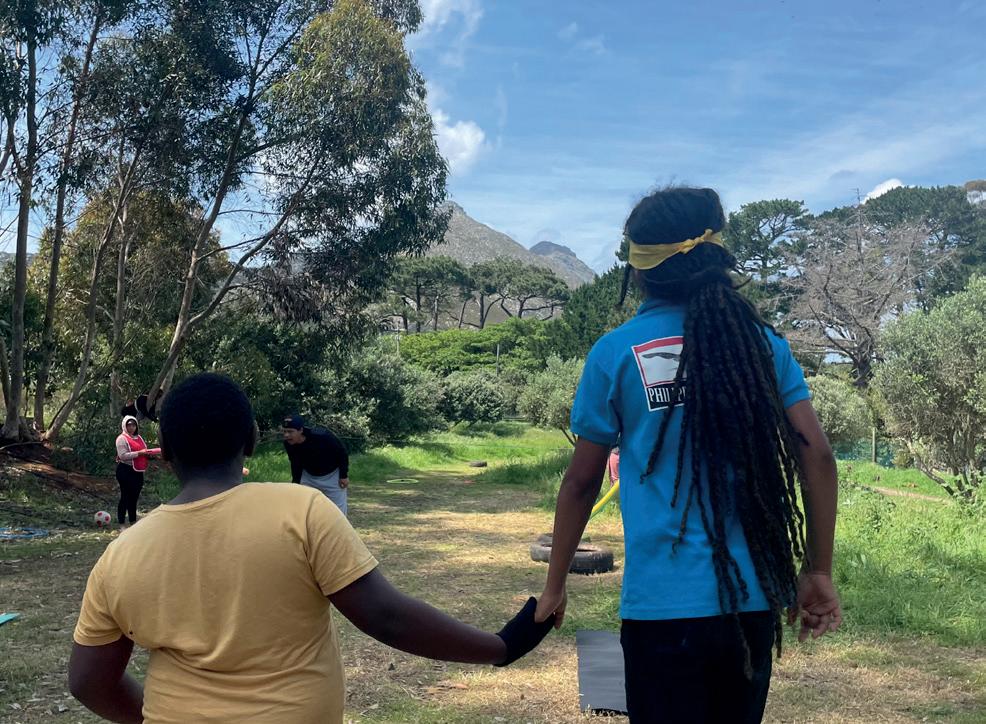
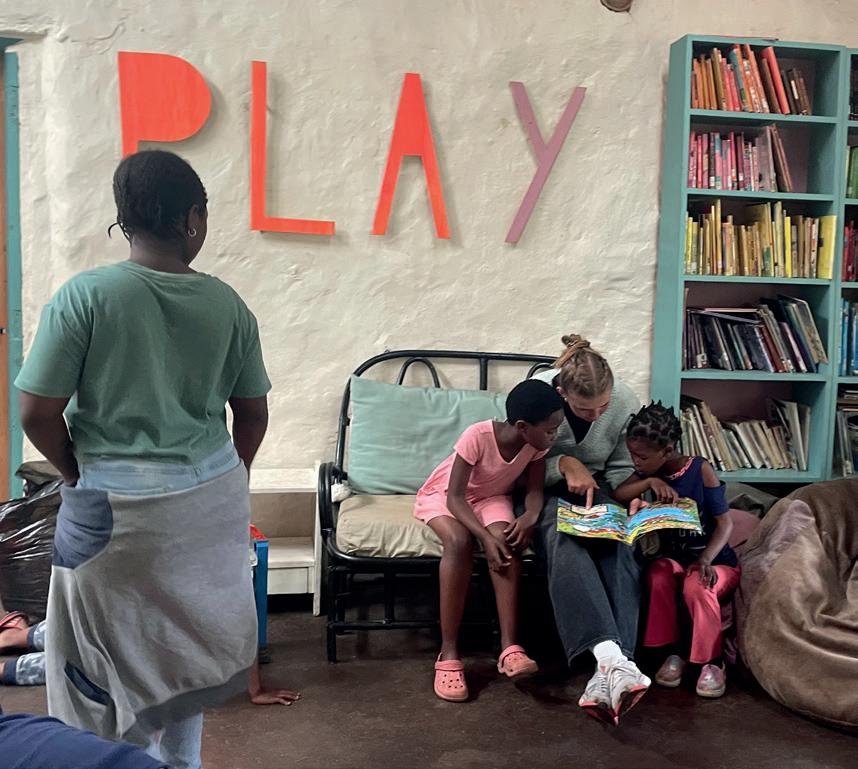
STUDY
PSYCHOLOGY
UCAS tariff: 112 – 128 points
Duration:
3 years full time (+ optional placement)
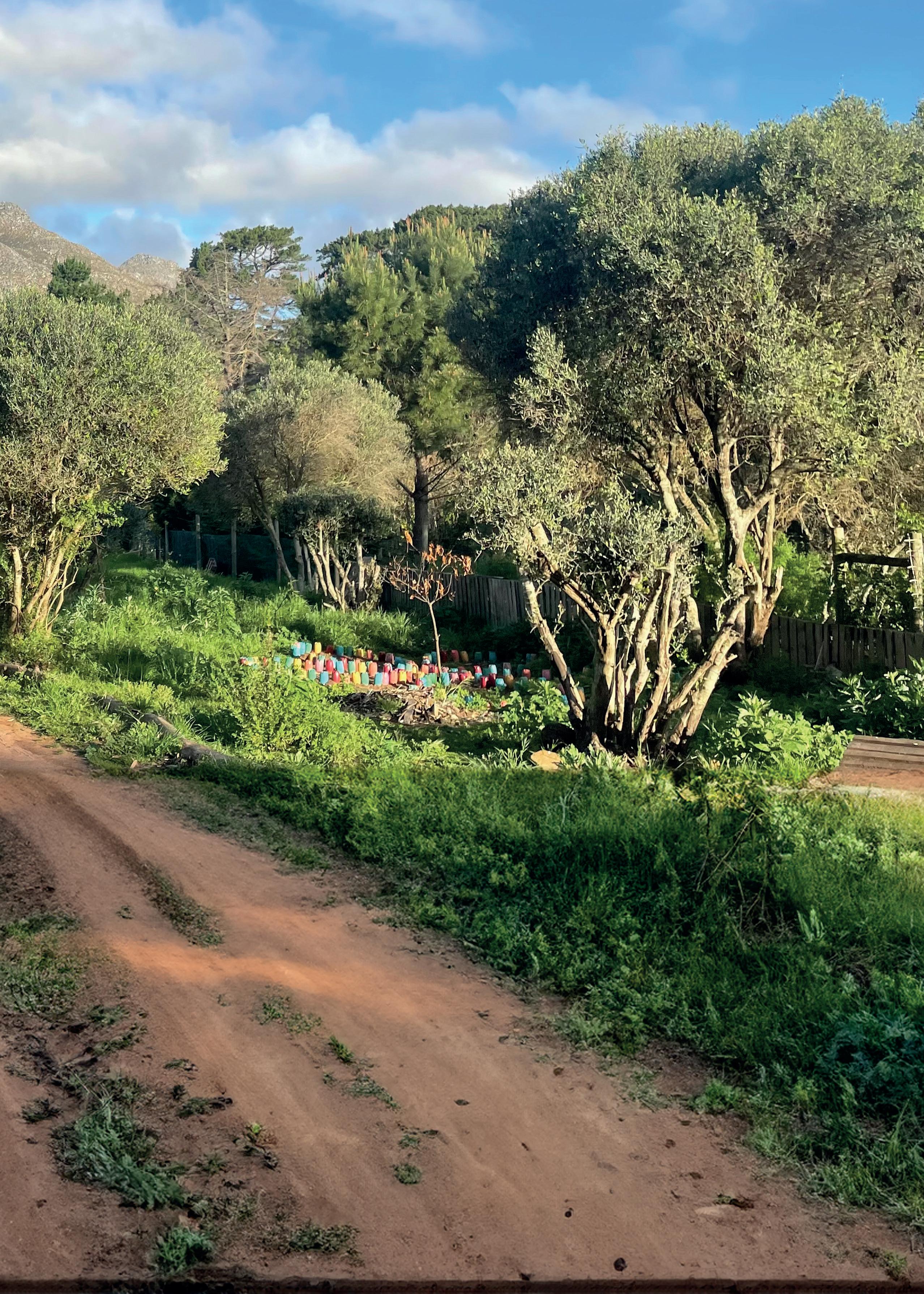
insightful lectures and individual meetings in which they provided advice and helped me with my application process.
DURING MY STAY, I EXPLORED MUCH OF SOUTH AFRICA WITH THE MANY FRIENDS I MET ALONG THE WAY. WE EXPLORED CAPE TOWN AND WENT HIKING, SURFING, TO FESTIVALS AND ON SAFARI.
One of my favourite parts of the placement was building incredible relationships with all the kids, particularly being able to make them laugh and smile despite their circumstances. I hope I have made as strong of a positive impact on their lives as they have made in mine.
This placement has taught me so much about the cyclical nature of generational
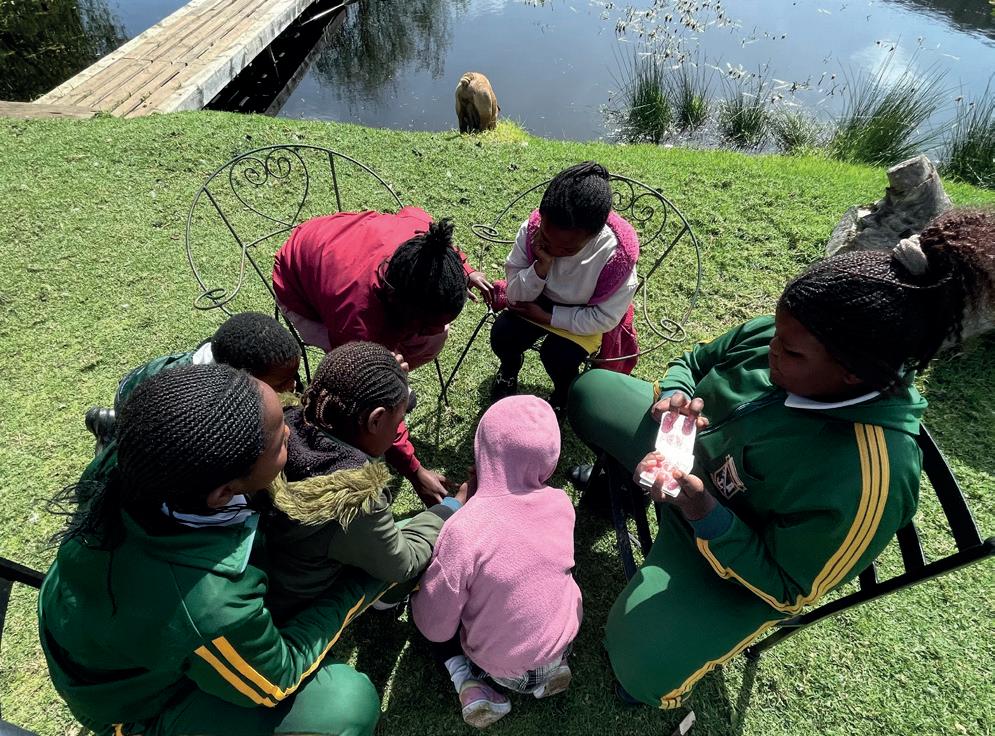
trauma and the grass root causes of mental health issues that cannot be learned in a classroom. I aspire to carry this knowledge and confidence forward with me, assisting me in my future career. This unique and practical experience will hopefully set me apart from other graduates and ultimately increase my employability.
PLYMOUTH HAS BEEN AN AMAZING FOUNDATION FOR MY FUTURE AND HAS GIVEN ME AN IMMEASURABLE AMOUNT OF OPPORTUNITIES AND INCREDIBLE MEMORIES, WITH MANY MORE TO COME.
I would massively recommend studying here to anyone, not only for the education but for the amazing memories and experiences it will bring!
“I was blessed with the opportunity to complete a three-month placement in South Africa. I worked with underprivileged children living in townships, providing a safe space, educational support, fun activities, and building a sensory garden for the community to enjoy.”
41
HOW PARENTS AND GUARDIANS CAN HELP EASE THE PRESSURE OF CLEARING
Lots of schools will have teachers on hand to help during the Clearing process, but parents and guardians can also help ease the pressure. After all, going to university is a big step for you too! You will want to lend as much support as you possibly can, which is why we have put together some practical tips on how you can tackle the rollercoaster that is Clearing together.
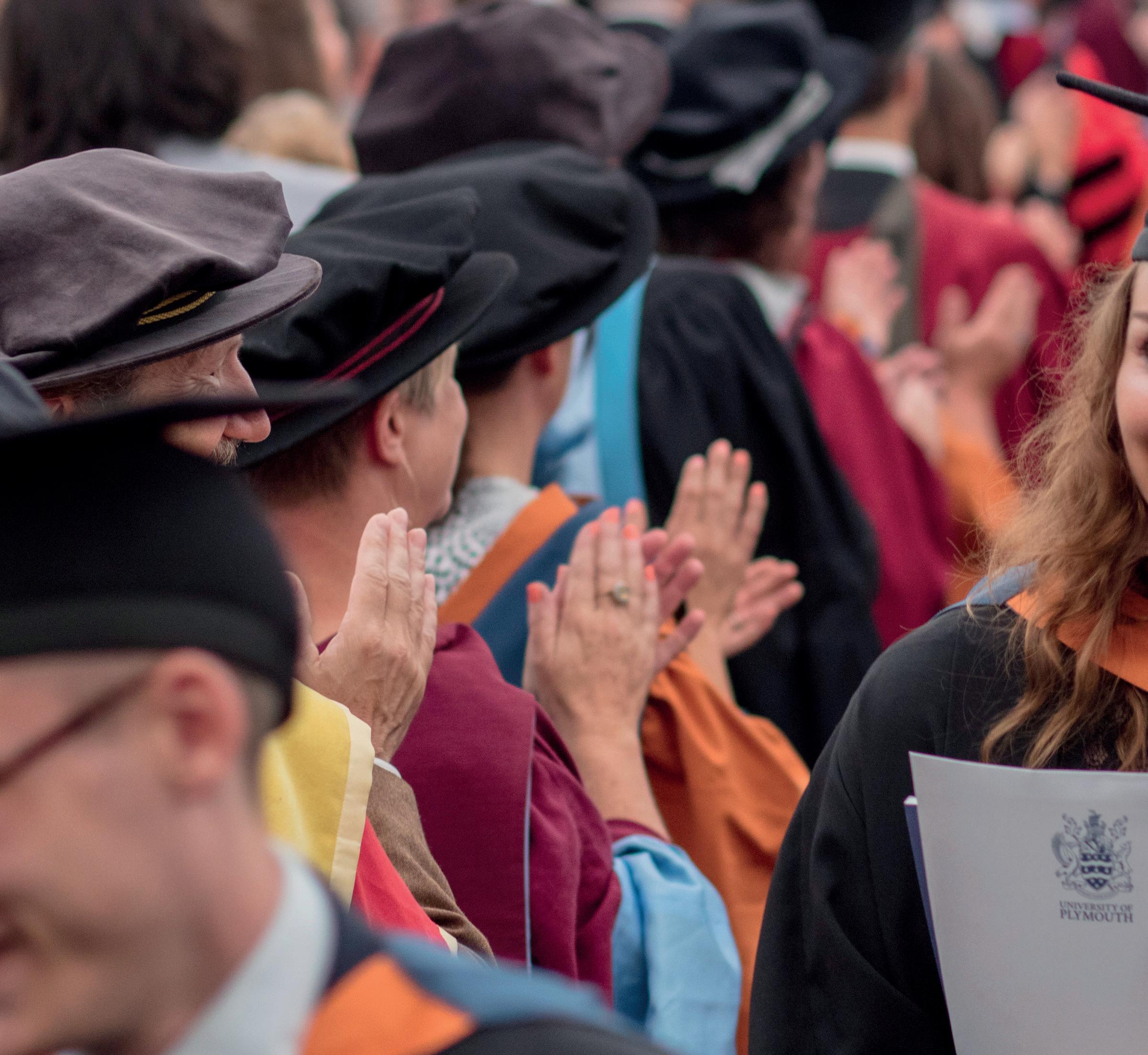
Top Clearing tips for parents and guardians:
Be proactive in the lead-up to results day by doing lots of research and planning. Have a look on the UCAS website for information, including important times and dates. Have a think about backup universities and course choices, ready for the day.
On the day, if your child is too nervous to ring universities, you can do this on their behalf. Universities will need confirmation from your child that they are happy for you to talk about their application, but this can be done over the phone or via email.
If you know your child is going to be away or unavailable on A level results day, make sure this is set up via UCAS beforehand and you are an intermediary contact on their UCAS application.
Make sure your child has any university correspondence to hand, so they can find their reference number if speaking to a university they have applied to before, or about their existing application. Also, make sure they know what their UCAS reference number is and UCAS log-in details for any new universities.
If your child has narrowly missed the required grades for their firm and insurance choice university, don’t panic. It is still worth ringing the universities to find out whether they can be offered an alternative course or what options they have available.
Have a look on university websites as there are many useful articles and pages about Clearing, including what it is and what to expect. For the University of Plymouth, you can visit plymouth.ac.uk/ clearing, which has lots of useful information about the basics on what Clearing is and how it works.
42
New
of this? Take a look at page 6 for a full guide to Clearing.
to all

If you can, take results day off work. Also, try and keep the weekend after A level results day free. A lot of universities hold Clearing open days for students, so you may need to attend the university campus/city that your child is considering, or has applied to.
Stay calm and positive. Your child may be disappointed, but there are so many options out there for students going through Clearing, and there is still time to make considered decisions before needing to apply for a new course/university.
Ultimately the choice lies with your child – but as parents and guardians you can guide them to follow their gut feeling, rather than being forced to say yes to a course or university that’s not right for them.
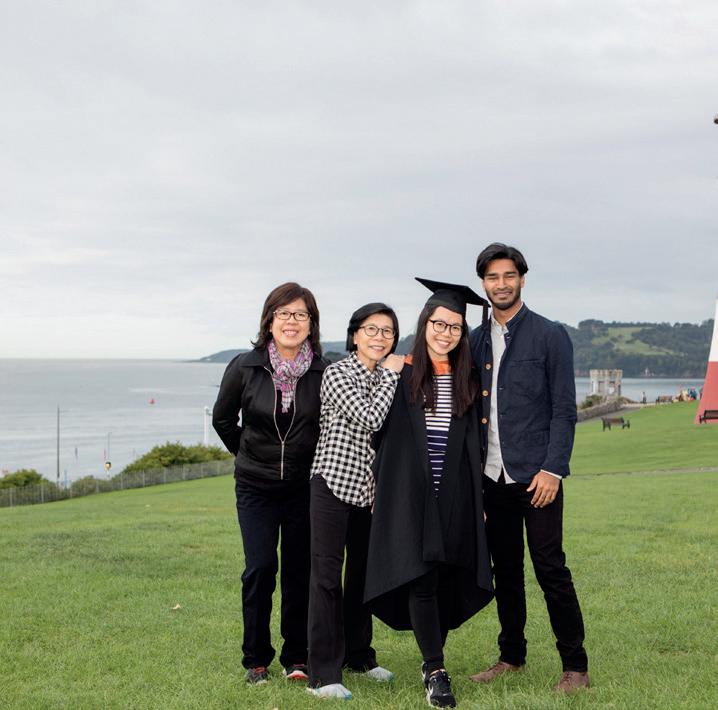
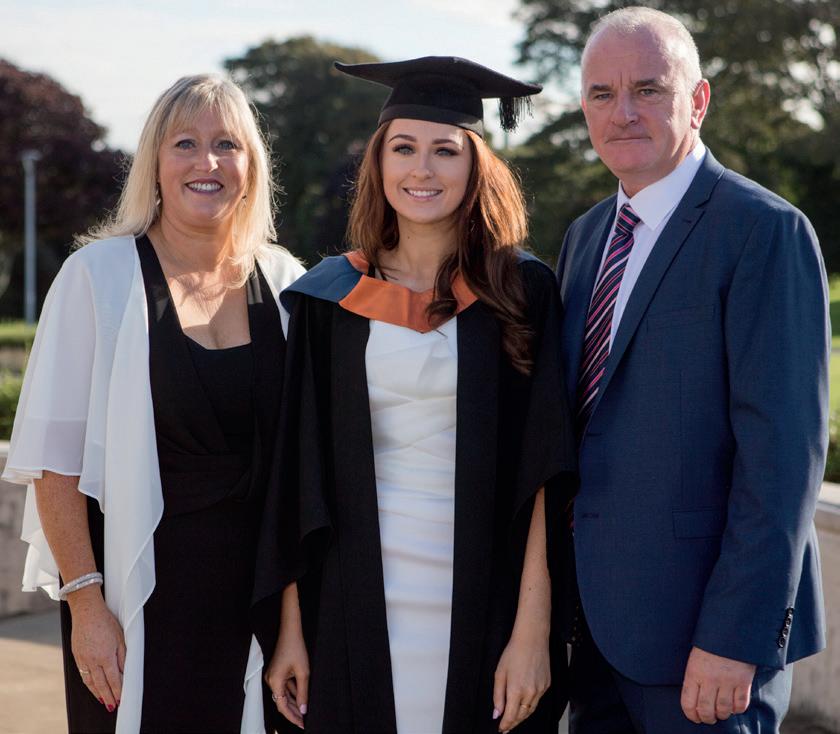
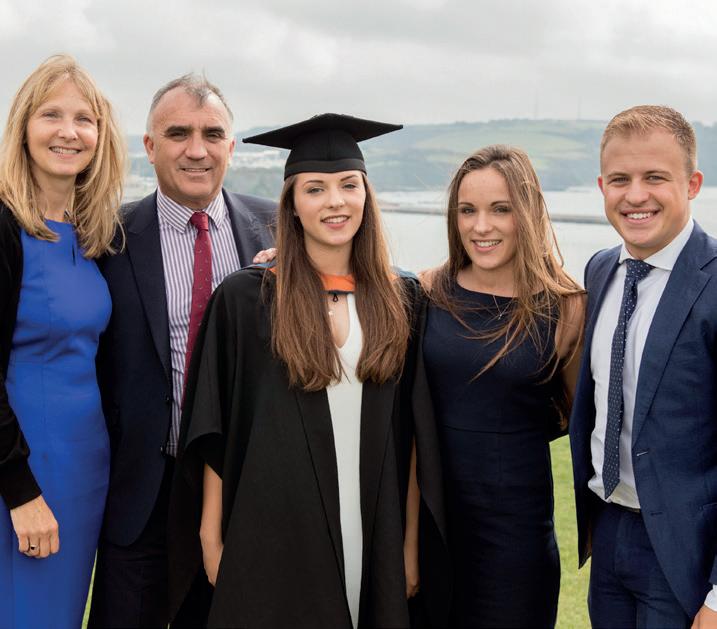

A PARENT’S GUIDE TO CLEARING
Mark helped support his son Ed through applying via Clearing last year. He tells us how the day looked for them and what his advice would be to parents.
Ed did look at league tables for his subject and locations he was interested in, but I tried to remind him other things were important to him initially and that the league tables fluctuate so much, they aren’t everything.
From our own experience with Clearing, here are some suggestions:
Do some further research on the universities and courses you have as offers.
Make a list of others that you might also consider in Clearing.
Look for student reviews and even live chats (not directly on their website).
Just before Clearing, have links or open web pages for all the university course pages – get phone numbers and pre-register.
Make sure phones and laptops, etc., are all fully charged.
Check on anything important like clubs/societies, guaranteed accommodation, and halls policies and costs, and make a shortlist.
Speak to friends who are considering university to see what they’re researching.
See whether your child can talk to one of the lecturers, or a student who is studying the subject your child is interested in.
Double check any reviews before accepting.
Ensure that your child has made a note of names and contact details, and is clear on what they need to do next.
I basically hung around his room and joined him (when I was allowed!). The key was to let him know I was showing an active interest in his research, and ultimately encouraging him to come to his own decision.
43
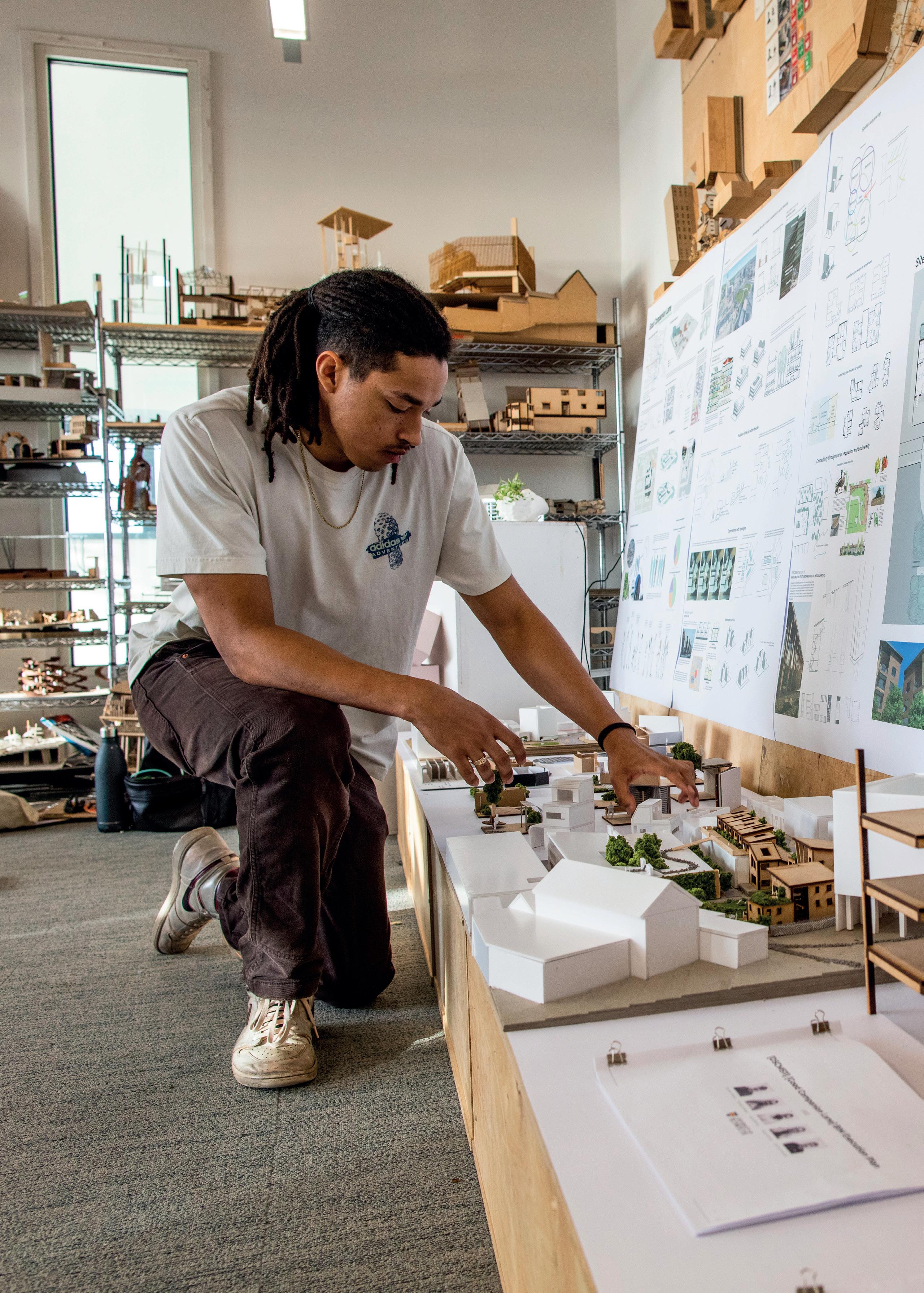
“Clearing felt like I was given a second chance, it was nice to feel accepted.”
Jared BA (Hons) Architecture IT’S YOUR FUTURE MAKE IT COUNT Find
out more




















































































